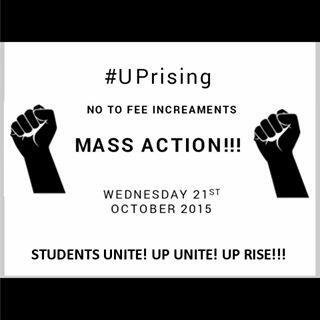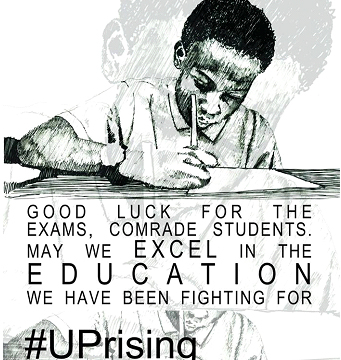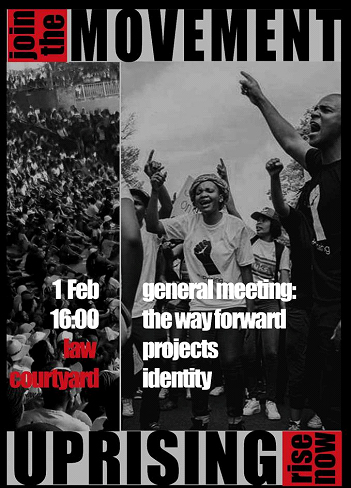The University of Pretoria (UP) opened in 1908 as a new department of the Transvaal University College (T.U.C). In 1930 the University College was upgraded into a fully fledged independent University and by 1932 the medium of instruction became exclusively Afrikaans and the University was exclusively for White Afrikaans speaking people. This continued until the mid-eighties.
On 15 February 1986, the University admitted its first twenty Black students. The number of people of colour (POC) being admitted to UP then increased dramatically since the end of Apartheid in 1994. The demographics of the University have altered fundamentally from an exclusively White (Caucasian) Afrikaans population to a multi-racial (multi-ethnic) population. The language policy at the University also gradually become bilingual, with English being offered as an alternative to Afrikaans.
In 2004, UP merged with the now defunct Vista University’s Mamelodi Campus. As part of a transformation process the University was meant to incorporate English and SePedi as second and third languages of communication. The dual language system of English and Afrikaans however remained the only languages of instruction and the cultural systems on campus, in terms of signage, statues and residence traditions still remain largely Afrikaans with little to no adaption/inclusion of other cultural systems.
UP implemented a Language Policy Task Team to review the University’s language policy in February 2015 due to ‘the rapidly changing student and staff demographics experienced by the University in recent years’.
Student political organisations, such as EFFSC-UP and SASCO-UP have been challenging the lack of transformation in the University. In April 2015, SASCO started an indirectly affiliated branch, called #TuksSoWhite. A social media campaign aimed at highlighting experiences of cultural supremacy and marginalisation. The recent protests were also led by an emerging non-partisan faction of students called UPrising that identifies as ‘a collective cause and movement of the students... that is not inclined to any political party but inclined to students’.
In September 2015, student protests on campus were building momentum as students led by UPrising, which comprised of individuals from a number of political organisations on campus and non-partisan students, collectively challenged the high fee increment set for 2016. By the time #WitsFeesMusFall sparked nationwide debate in October, UP student protesters had drafted a memorandum addressing common student issues, such as a demand for free education and a demand to end outsourcing for University workers. As well as addressing more unique issues, namely the language policy. The memorandum was handed over to and received by the Vice Chancellor and Principal of the University, Professor. Cheryl de la Rey.
In October 2015, UP and institutions around the country were systematically shutdown by protesting students. The protests resulted in a Presidential address, in which the President Jacob Zuma, announced a zero percent increase in fees for 2016. Many students returned to their usual academic schedules, while many others continued to protest for demands that were not met or addressed. Hundreds of UP students continued to protest following a mass meeting led by UPrising, where students collectively decided on the direction of the movement. On Monday, 26 October Prof. De la Ray signed off on a memorandum of 13 demands put forth by the students, putting a temporary end to days of protest on the campus.
When the academic year started on 11 January 2016 with student registration, students primarily from the EFFSC and UP workers protested outsourscing of workers together in the Client Service Centre (CSC) where the registrations were meant to take place. The #EndOutsourcing protests lasted for a number of days and was met with police force at UP. Protesters were shot with rubber bullets on the campus while registrations were taking place. On 20 January 2016 the students and workers achieved a written commitment from the University to insource their workforce amongst other workers demands
The lack of protests on campus was again short-lived as student bodies, now largely fragmented from the banner of UPrising, continued to protest the language policy. Leadership of the EFFSC-UP accused the University of delay tactics in addressing the issue and continuing to perpetuate cultural supremacy. The University has also been lauded for continuing to spend millions of Rand to maintain Afrikaans as a medium of instruction every year, when only around 17% of students use Afrikaans as a medium of instruction.
Protests resumed in and around campus resulting in the campus becoming a high conflict zone with heavy police and security presence. On February 2016, 27 student protesters were arrested, 24 of which are going through court proceedings and are expected to appear in the court again on 18 July 2016. These arrests came off the back of major conflict between primarily White pro-institutionalised Afrikaans and primarily Black anti-institutionalised Afrikaans protesters. Following the incident, the University took a ‘zero tolerance’ approach towards ‘disruptive’ protests and attempted to place a social media ban on politisiced students from inciting ‘hate speech’.
The Language Task Team set up by the University proposed a single language policy where English will be the only medium of instruction language, with SePedi and Afrikaans being used in tutoring. Afriforum Youth, Afriforum and other Afrikaans-led political parties rejected this proposal. A consultation process with various work-streams involving stakeholders was subsequently set up to address the issues of language policy and other issues.
The consultation process is in still in progress however various key stakeholders have pulled out of it, including the EFFSC and Afriforum.
Timeline
15 September
- University of Pretoria (UP) Student Representative Council (SRC) attempts to hold mass meeting in the Amphitheatre. The meeting is in part concerned with the high registration fee increment for 2016.
29 September
- The SRC releases a statement [101] on their Facebook page, calling for a mass march on 30 September ‘to the ship to hand over a memorandum [102] and petitions signed by students, to management about the fee increment. ‘
The statement goes onto say, ‘The SRC rejects the fee increment saying we do not accept this notion and we want a decrease in registration fees, resident fees and the fee increase in general’. Students are encouraged to bring people they know to the march.
The statement ends off, ‘This increase affects every student at UP and we as students need to say no and stand together!!’.
30 September
- A small body of students march in protest of the registration fee increment for 2016.
14 October
- Student protests begin at Witwatersrand (Wits) University under the banner #WitsFeesMustFall. Students begin blockading entrances and disrupting academic activity. The protest is organised by Wits SRC, and is in remonstration of the high fee increments for 2016. The protests gain widespread media and public attention.
15 October
- Economic Freedom Fighters Student Command (EFFSC) UP releases a letter [103] received by their Office of Secretary. The letter is in response of various issues they have raised with UP management, including the dual language system of English and Afrikaans in the University and demands for the University to put forward timelines for such issues they are addressing.
The University says it has appointed a Language Policy Task Team, and one of the tasks of the Task Team is to set up discussions with staff and students so to review the UP language policy.
The letter from the University ends off by warning EFFSC UP to use available chains of communication, namely the SRC, or run the risk of closing off communication channels.
19 October
- UP Vice-Principal meets with SRC to continue discussions on the student fees for 2016.
UP releases a statement [104] on 20 October regarding the meeting:
‘At the meeting the University agreed to the alternative proposals for the initial payments as submitted by the SRC last week, bringing the registration fee for undergraduate students (including new students) in 2016 to R5 500 and not R7 500... In light of the declaration made at the 2nd Higher Education Transformation Summit, which was attended by both the Vice-Chancellor and the Vice-Principal, the University has declared its commitment to the affordability of student fees in light of the current economic climate. Further meetings with the student leadership have been scheduled.
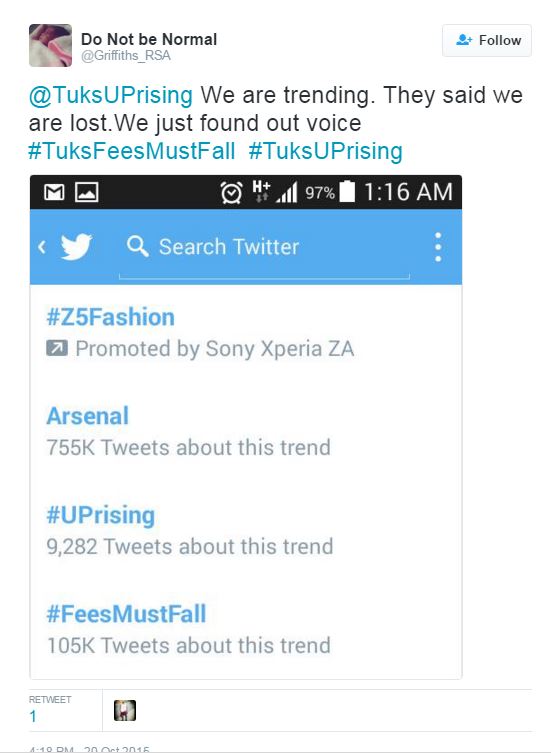 #UPrising trends on twitter as student protests begin to get national attention. Image source
#UPrising trends on twitter as student protests begin to get national attention. Image source
20 October
- Minister of Higher Education and Training, Blade Nzimande meets with university V.C’s at Western Cape Parliament.
Nzimande announces that 2016 fee increases will be capped at an inflation-linked 6% and a task team will be established to investigate the issue of fee increases, and report back in six months to advise on future hikes.
- Student protesters collect nationwide under the banner #FeesMustFall and reject the 6% cap as a resolution and plan a national shutdown of campuses for 21 October to further protest against fee increments for 2016, as well as the lack of response to other demands, such as a commitment to #EndOutsourcing.
- A mass action protest for no fee increments is planned for the following day at UP, under the banner #UPrising and #FeesMustFall.
- Some students sleep on campus in preparation for the upcoming protest.
- In preparation for upcoming protest UP suspends all academic activities for 21 October.
“All academic activities and support services of the University of Pretoria are suspended for Wednesday 21 October 2015 to allow for peaceful engagement on key issues affecting the institution. Tests and examinations for the said date have been rescheduled.”
- EFFSC affiliated SRC President, Mosibundi Rassie Rasethaba, releases a statement [105] responding to UP management claims that it recently reached an agreement with the SRC:
‘...I assure you that the only truth in that statement is that the meeting was held. However this meeting did not include the majority of the SRC: it was constituted by only 3 members of the SRC, the Registrar and the Vice-Principal. For this reason no agreement could be reached due to a lack of an SRC quorum. Furthermore to show the illegitimacy of this statement only one point from a range of issues concerning the fee paying structure was mentioned. This begs the question that if the agreement was reached why aren’t the rest of the concessions not included in the statement... ‘
21 October
- The University obtains a secret court order interdict [106] in the chambers of High Court in Pretoria through Judge Peter Mabuse, against protesting students displaying any ‘disruptive’ behaviour. This interim interdict will enable the police to arrest any student who ‘misbehaves’.
According to UP's court papers, the ‘student protests have turned into riots accompanied by unlawful and unruly behaviour by participants that threaten the safety of students, staff and university property’.
The University also states in the court papers that the cost of tuition was an ‘issue on which the applicant has great sympathy for its student and their parents’.
- Students gather on Hatfield campus and then spill out onto the surrounding streets, in what is reported [107] as a peaceful protest numbering in around a thousand protesting students.
Fidelity security guards and UP security officials run inside the administration block as the students approach.
The Vice Chancellor (V.C.) of UP, (Professor) De la Rey, is present on campus and receives the memorandum [108] handed over by the students. She briefly addresses the students and declares the University management’s commitment to resolving the current problems.
The demands listed on the memorandum are as follows:
1. We demand free education.
2. We demand no fee increment (zero percent) across the board.
3. We demand that no person(s) participating in this mass protest action be victimised and/or prosecuted by the University or its affiliates.
4. We demand provision be made for students participating in this mass protest action to catch up on any academic activity which was disrupted and/or missed as a result of said action.
5. We demand that Food Services (TuksRes) must decrease their prices to be market competitive. In the interim, we are launching an investigation with the Competition Commission, as well as the office of the Public Protector in order to follow up.
6. We demand that any and all financial decisions impacting on students must be proposed to students no later than September each year.
7. We demand that a student’s financial status shall have no bearing on their ability to retain their Residence placement.
8. We demand that every person who is deemed fit for financial aid, as per the NSFAS criteria, receive such financial aid from the University.
9. We demand the removal of application fees as well as the residence levy fee.
10. We demand that a seat be allocated to a student representative on the Standing Committee of the Council.
11. We demand no interest rate (zero percent) on any outstanding fees owed by a student.
12. We demand no registration fee.
13. We demand that Council convenes and ratifies this document in our presence.
- V.C. De la Rey releases a statement [109] on the UP website that the University has agreed with the 6% tuition cap on fee increases for 2016, following the agreement reached with Nzimande the day before, and that students will be exempt from paying the tuition fee for 2016 under certain circumstances.
The statement also addresses the memorandum the University received from students, proffering that, ‘the Executive is currently studying with a view to giving them a response as soon as possible’.
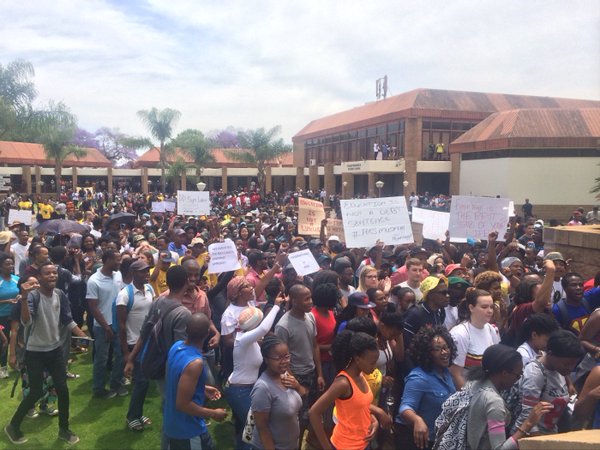 A large inter-racial body of students protest high fees at the University of Pretoria. Image source
A large inter-racial body of students protest high fees at the University of Pretoria. Image source
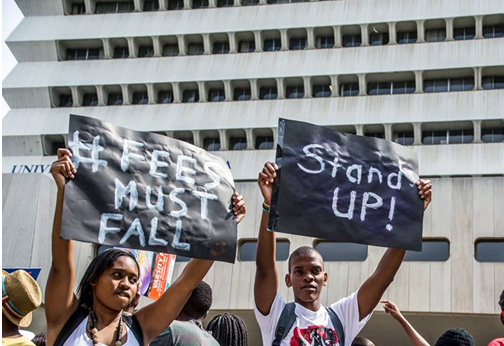 CREDIT: Fezekile Msimang Image source
CREDIT: Fezekile Msimang Image source
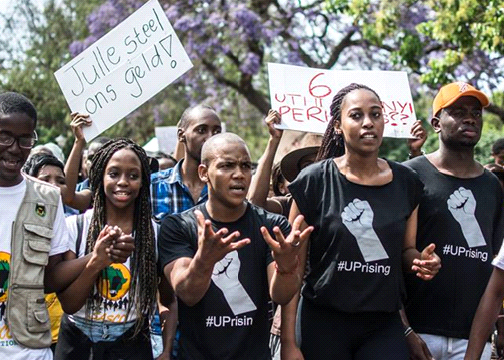 CREDIT: Fezekile Msimang Image source
CREDIT: Fezekile Msimang Image source
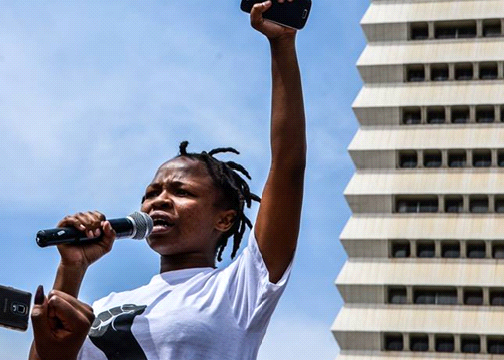 CREDIT: Fezekile Msimang Image source
CREDIT: Fezekile Msimang Image source
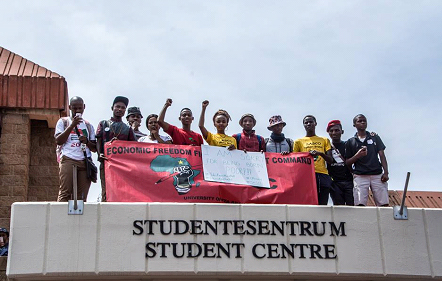 Students from different political backgrounds and non-partisan students unite under the banner #UPrising.CREDIT: Fezekile Msimang Image source
Students from different political backgrounds and non-partisan students unite under the banner #UPrising.CREDIT: Fezekile Msimang Image source
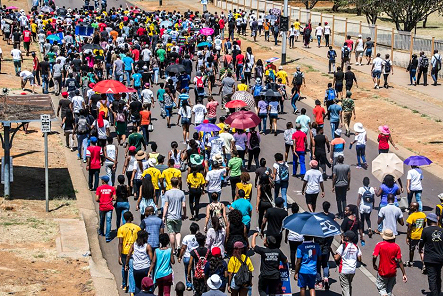 Students march to hand over memorandum to UP management. CREDIT: Herman Hoogenboezem Image source
Students march to hand over memorandum to UP management. CREDIT: Herman Hoogenboezem Image source
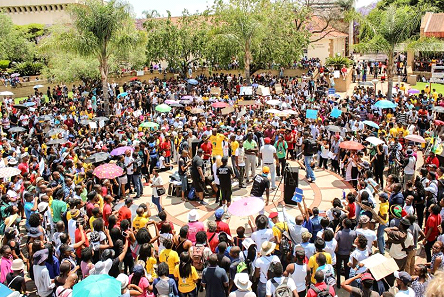 CREDIT: Shen Scott Image source
CREDIT: Shen Scott Image source
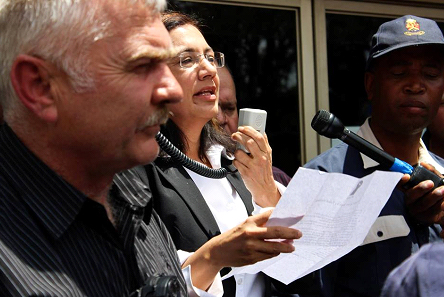 Vice Chancellor, Prof. De la Rey, comes out to address students and receive the memorandum. CREDIT: Shen Scott Image source
Vice Chancellor, Prof. De la Rey, comes out to address students and receive the memorandum. CREDIT: Shen Scott Image source
22 October
- The Presidency releases a statement [110] that South African President Jacob Zuma would meet with university leaders as well as student leaders at the Union Buildings in Pretoria ‘to discuss the stalemate with regards to university fee increases’.
- During the morning hundreds of UP students fill the Amphitheatre in song and dance. The meeting is to chart the way forward as protests against the fee hikes for next year continue to gather momentum across the country.
The students discuss the upcoming meeting with President Zuma, scheduled for Friday, 23 October.
Protest leaders address the students, calling on them to occupy Burnett Street in Hatfield, near the campus.
- The University releases a statement [140] that it will be suspending academic activities for the rest of the week and rescheduling the academic programme. The statement also goes on to say that the issue is a national problem and that, ‘the Vice-Chancellor and Principal is engaging with government to find a solution and will also be participating in the Presidential Working Group to seek a solution.’
- Students are expected to leave the campus by midday.
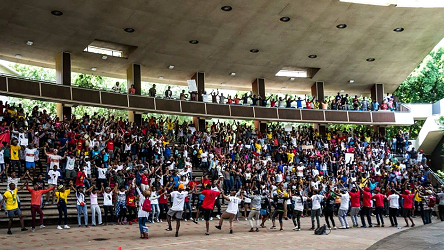 Student protesters have a mass meeting in the Amhitheatre to decide on the direction of the movement. CREDIT: Shen Scott Image source
Student protesters have a mass meeting in the Amhitheatre to decide on the direction of the movement. CREDIT: Shen Scott Image source
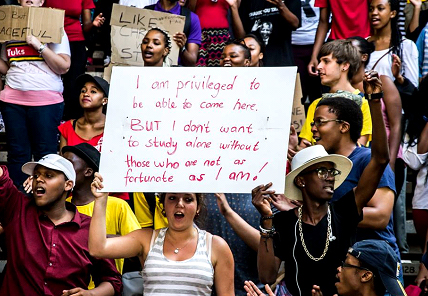 CREDIT: Shen Scott Image source
CREDIT: Shen Scott Image source
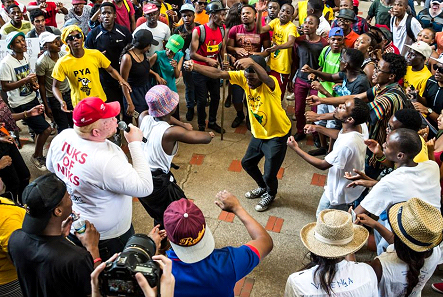 CREDIT: Shen Scott Image source
CREDIT: Shen Scott Image source
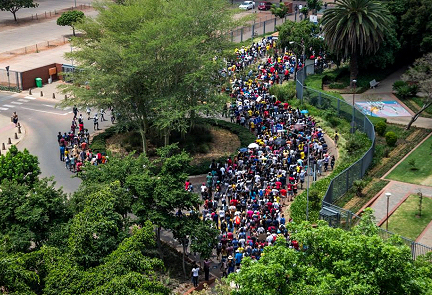 Students march to occupy Burnett Street. CREDIT: Shen Scott Image source
Students march to occupy Burnett Street. CREDIT: Shen Scott Image source
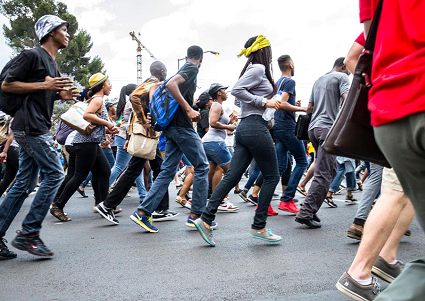 CREDIT: Shen Scott Image source
CREDIT: Shen Scott Image source
23 October
- At 09:00, the UP Amphitheatre is beginning to fill up as protesters ready themselves for the march to Union Buildings. While waiting for the rest to join, students are doing things like singing protest songs and writing dissenting placards.
Many of the students can be seen wearing black and white tops that read UPrising.
The large group of FeesMustFall student protesters leave the amphitheatre and march to the Union Buildings behind a line of metro police.
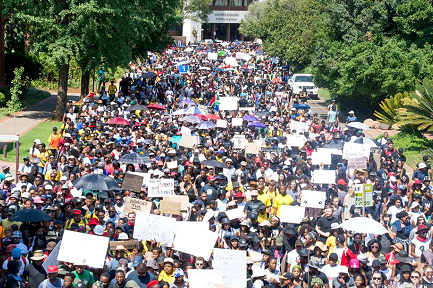 Thousands of UP students march to Union Buildings for the Presidential address. CREDIT: Fezekile Msimang
Thousands of UP students march to Union Buildings for the Presidential address. CREDIT: Fezekile Msimang
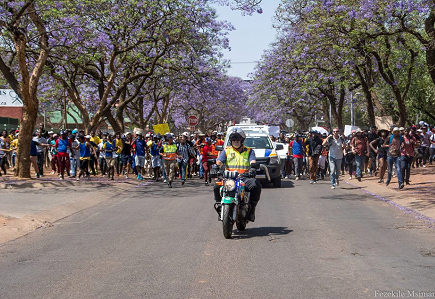 Upon arriving at the Union Buildings, UP marchers do a circuit around the grounds. CREDIT: Fezekile Msimang Image source
Upon arriving at the Union Buildings, UP marchers do a circuit around the grounds. CREDIT: Fezekile Msimang Image source
Meanwhile in Johannesburg, buses are filling up with students prepared to go to the capital to join their peers outside the Union Buildings.
Students arrive in their masses, and before noon thousands fill the Union Building’s lower grounds.
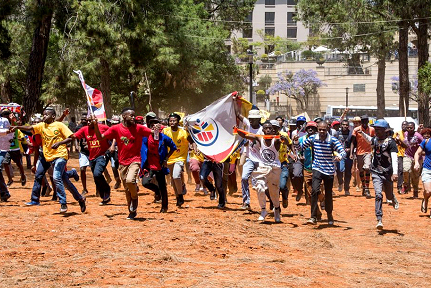 Upon arriving at the Union Buildings, UP marchers do a circuit around the grounds. CREDIT: Fezekile Msimang Image source
Upon arriving at the Union Buildings, UP marchers do a circuit around the grounds. CREDIT: Fezekile Msimang Image source
President Zuma is scheduled to address public on student issues after a meeting with V.Cs and student representatives. Some student reps have chosen not to partake in the meeting to illustrate that their demands are non-negotiable.
By noon a relatively small group of protesters set mobile toilets on fire.
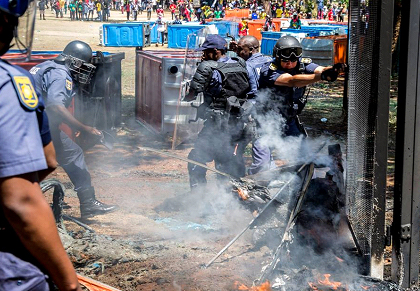 Police extinguish a fire started by protesting members in the crowd. CREDIT: Fezekile Msimang. Image source
Police extinguish a fire started by protesting members in the crowd. CREDIT: Fezekile Msimang. Image source
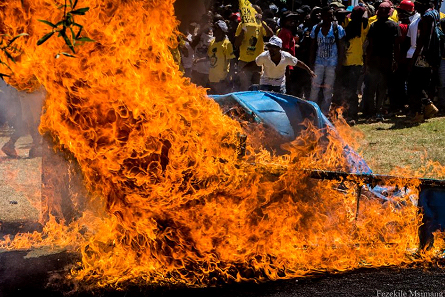 Portable toilets are set on fire by unknown members in the crowd. CREDIT: Fezekile Msimang Image source
Portable toilets are set on fire by unknown members in the crowd. CREDIT: Fezekile Msimang Image source
Following this, the crowd is dispersed with rubber bullets (rubber-coated projectiles) and teargas by police on the ground.
The crowd re-groups several times, each time being disrupted by the small group in the crowd antagonising police, and the police retaliation with teargas and flash-bangs.
A group of various individuals pelt rocks towards the higher levels of Union Buildings, and some manage to cross the barricade for a short while before being pushed back by police.
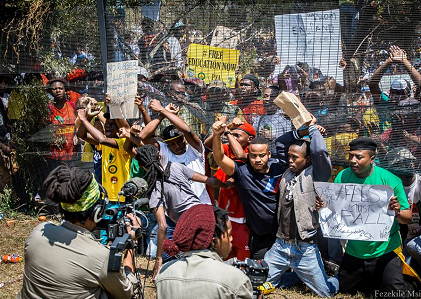 Some protesters manage to get behind the fence separating Union Building lower grounds from the building. CREDIT: Fezekile Msimang Image source
Some protesters manage to get behind the fence separating Union Building lower grounds from the building. CREDIT: Fezekile Msimang Image source
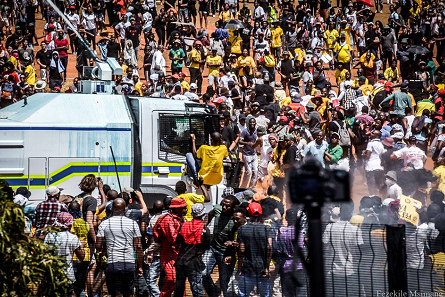 A protester jumps on a water canon vehicle. CREDIT: Fezekile Msimang Image source
A protester jumps on a water canon vehicle. CREDIT: Fezekile Msimang Image source
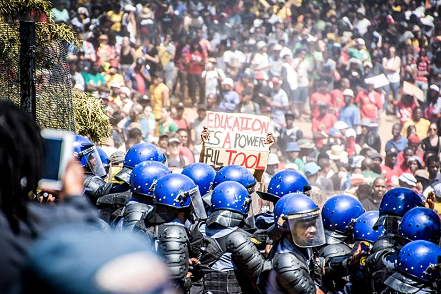 CREDIT: Fezekile Msimang Image source
CREDIT: Fezekile Msimang Image source
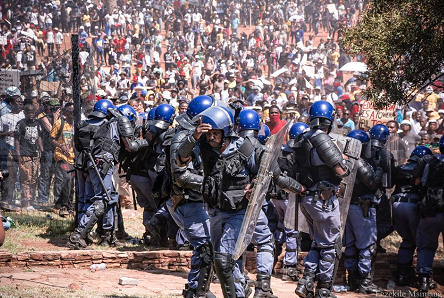 Officer injured by thrown object. CREDIT: Fezekile Msimang
Officer injured by thrown object. CREDIT: Fezekile Msimang
By 1pm two helicopters are hovering over the crowd, dropping teargas bombs to disperse it.
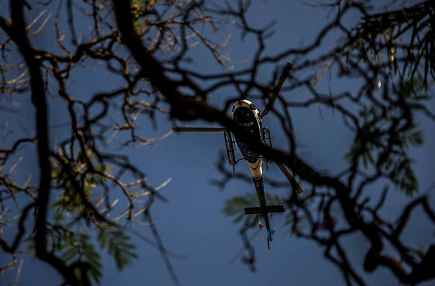 CREDIT: Shen Scott Image source
CREDIT: Shen Scott Image source
While students are dispersing a false alarm that the President will be coming out to address the crowd is spread from an unknown source.
The President does not come out to address the public
Before 3pm a 0% increase of fees for 2016 is announced [42] for tertiary institutions nationwide live on broadcast stations instead.
The police force the agitated crowd out of the Union Buildings.
A small group of protesters remain and protest in the street outside Union Buildings.
By 4pm military hippos are driving up and down clearing the streets of remaining protesters. However a number of protesters continue to re-group and barricade the street.
Protests intensify into the night, not necessarily consisting of the same people protesting outside Union Buildings earlier.
Two police vehicles are set on fire.
Reporting suggests that students were not necessarily implicated in the violence that took place outside Union Buildings.
After leaving the Union Buildings, hundreds of UP students meet at the Ampitheatre to collectively make a decision on the direction of the movement. The group of student protesters decide to continue protesting till issues are further addressed.
In London hundreds of South Africans gathered at the SA High Commission in support of #FeesMustFall
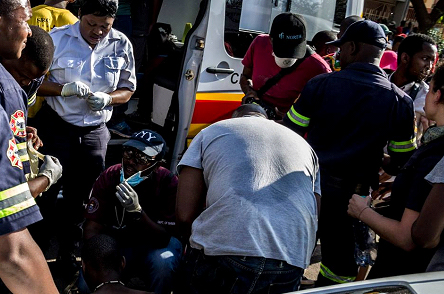 A number of protesters need medical attention. CREDIT: Shen Scott Image source
A number of protesters need medical attention. CREDIT: Shen Scott Image source
26 October
- UP campus reopens
- UP releases a statement [144] that students meeting certain criteria will be exempt from paying the initial registration fee. The university also announces that there will be no fee increase next year, ‘in all undergraduate, postgraduate and international students and there would also be no increase in residence accommodation fees, meal fees and any initial payments.
‘...In addition, students in financial need who have outstanding residence fees will be considered individually for assistance should they meet all other residence placement criteria. Also, for students in financial need, the application fee will not be payable during 2016 for the 2017 academic year.’
- De la Rey and student protesters from the UPrising movement sign off on a memorandum of demands [141] that put an end to four days of protest action at UP.
Detailed account given by Perdeby, official school newspaper of UP:
‘At 07:00 a meeting took place at the Amphitheatre in order for students to take a vote on the direction the movement was heading. In an overwhelming majority, students present voted in favour of continuing with mass action on campus and imposing a shutdown of the university. At approximately 08:30, UPrising and students began what was to be an eight-hour occupation of UP’s Client Service Centre (CSC).
Soon after the occupation had begun, the UP student body was notified that all academic activities for the day had again been suspended due to the disruptions. UPrising’s occupation of the CSC was an attempt at getting [De la Rey] to attend to all their other demands that had not been met.
After several hours of occupation, it was agreed that [De la Rey] would address students in the CSC at 12:30. [De la Rey] went on to accede to all 13 demands put forward in the protest on 21 October, and also agreed to several additional issues which were raised during the address.
On the demand for free education, [De la Rey] stated that, as a public institution, UP was not in a position to give any undertaking on behalf of the government on the provision of free education. On the second demand for no fee increment across the board, [De la Rey] stated that UP was committed to the outcomes of the meeting held with President Jacob Zuma. There will be no fee increases for all students in 2016, including no increase in tuition fees, initial payments, residence accommodation and meal fees.
The third demand, which stated that no person who took part in the protest action at UP would be prosecuted by UP, was agreed upon, provided that students continued to behave peacefully.
The fourth demand added that provision should be made for all those who took part in protest action to catch up on academic activities missed due to the protest. [De la Rey] agreed to this, with the academic year being extended by one week.
On the demand that food services decrease their prices to be market competitive, [De la Rey] said that all food prices which were previously not market competitive would be decreased to adhere to this. [De la Rey] also welcomed UPrising’s intention to launch an investigation with the Competition Commission and the Public Protector to follow up on food prices at UP.
[De la Rey] further agreed that all financial decisions impacting students must be proposed to students no later than September of the previous year, and that students’ financial status should have no bearing on their ability to retain residence placement.
UPrising’s eighth demand stated that all students who met NSFAS criteria for financial aid should receive such aid. [De la Rey] addressed this point by referring to UP allocating an additional R20 million to help NSFAS students who needed financial assistance.
On the demand to remove application and residence fees, [De la Rey] stated that students in residences who are financially disadvantaged would not be excluded from such residences on the basis of their financial disadvantage. In response to the demand for no registration fees, [De la Rey] said that all working class students will be exempt from the fee. [De la Rey] further explained that “working class” will be determined according to a student’s family income. Furthermore, no interest will be charged on outstanding fees owed by students.
[De la Rey] also confirmed that, on the demand for a seat to be allocated to a student representative on the Standing Committee of the Council, an amendment of the Statute of the University of Pretoria will be considered by council in November this year.
[De la Rey] met UPrising’s final demand by ratifying the memorandum.’
30 October
- UP releases a statement [142] concerning the Memorandum of Agreement [145] entered into between the V.C and Principal and student leaders on 26 October 2015.
UP has set up an Interim Financial Helpdesk that will be operational as of noon Monday, 2 November 2015.
They also assure that all students who qualified for NSFAS in 2015 and ‘who were not assisted or not assisted sufficiently in 2015 will be assisted using the additional funds the University of Pretoria has made available for this purpose.’
Residence meal allocations will be extended for resident students that have run out of funds for meals, till the end of the revised 2015 examinations period.
Students are also assured they will not be excluded from residence re-placement on the basis of unpaid accounts.
9 November
- UPrising releases statement [143] regarding meeting set for today that has been disrupted. The statement clarifies that the meeting will be postponed and asks for patience in this process.
13 November
- UPrising Facebook statement[111] in solidarity with #UJNightVigil being held to speak out against police brutality:
‘Members of UPrising are currently present at the ?#UJNightVigil? which is being held by the leaders of the FeesMustFall movement at UJ, to speak out against the violence students & workers have been facing throughout the country ? #HandsOffOurStudents? ?#HandsOffOurWorkers? ... We endorse this message of condemnation against the violent force exerted by private security, campus security & the police force ‘
26 November
- UPrising releases statement [112] in solidarity with Open Stellenbosch’s effort to reform language policy at Stellenbosch University.
‘...We agree that there is an urgent need to reform the language policy at the University of Stellenbosch. We agree that the conditions created by this language policy are actively opposed to true multilingualism, inclusively, equality of opportunity and social environment created by this policy render it academically, economically and socially unjustifiable at a public institution of higher learning...’
11 January
- UP opens for enquiries.
- A group of UP students and workers disrupt registration during a protest against outsourcing.
The group occupied the Client Service Centre (CSC). Some students allegedly vowed that no registration would take place until their demands are met and some said they would boycott lectures.
Few security staff are present on the main campus.
- EFFSC UP is at the forefront of the protest with workers.
An EFF student leader, who does not want to be named, said University management told them they were first discussing student fees before they would deal with a commitment to insourcing.
- Joint statement [113] from the V.Cs, Principals and Rectors of Universities of South Africa:
‘...We also amplify the call for better subsidisation of the university sector by the state, in line with the current and projected growth of the sector.
...
Students will therefore still be required to pay their student fees in 2016, even if these have not increased. This is one of the key revenue streams that keep universities financially sustainable. Universities, in turn, commit to mobilising new funds, where possible, to support financially needy students. It is our contention that universities are not profit-generating organisations, but do have to be financially sustainable. We as vice-chancellors have to ensure that we safeguard our universities so that they can also benefit future generations.
...
The underfunding of the higher education sector has been recognised by the state, the Department of Higher Education and Training and other stakeholders. This matter is also highlighted in the 2013 Report of the Ministerial Committee for the Review of the Funding of Universities chaired by Mr Cyril Ramaphosa which acknowledges that “government funding has not kept pace with the growth of enrolments in the system”.
...
We welcome and will participate fully in conversations around a new funding formula for universities, which is expected to take effect in 2017.’
12 January
- UPrising announces on social media that the University will be shut down tomorrow, 13 January, due to mass protest. And that further communication will be relayed.
- UP obtains another urgent court interdict to prevent protests on campus and allow student registrations to proceed.
- A group of about three hundred Unisa and UP Workers and students disrupt registration at both institutions in protest for #OutsourcingMustFall.
- Police on the scene shoot rubber bullets and stun grenades at demonstrators, allegedly without provocation.
Several workers and students are injured and have to receive medical attention.
The SRC secretary-general Donovan du Plooy, claims students have been arrested for public violence and says answers are being demanded from management as soon as possible.
“People are waiting and if management doesn’t respond in an hour or two we will start protesting because at the moment they have been driven out and have regrouped at one of the entrances.” He said.
A protester says the police provoked them, “The police allowed us to get inside and after that they started shooting at us”.
Gauteng police spokesperson Lieutenant Kay Makhubela said stun grenades were used and not rubber bullets. Makhubela also said police are not aware of any injuries.
- UP releases statement [114] that it will be shut down for the day to ‘ensure safety of staff, students and property’.
UP releases another statement [115] that contracted workers and students from other institutions gained illegal access into Hatfield.
As face to face registrations are shutdown, online registration is recommended.
The University is set to be closed for the following day, 13 January.
The University closes off the statement by adding it is also working closely with the Department of Higher Education and Training to resolve the situation.
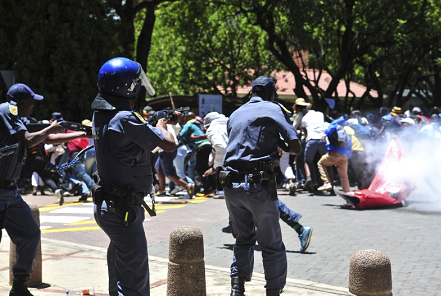 Police shoot student and worker protesters as they disperse. CREDIT: Christine Vermooten, The Citizen Image source
Police shoot student and worker protesters as they disperse. CREDIT: Christine Vermooten, The Citizen Image source
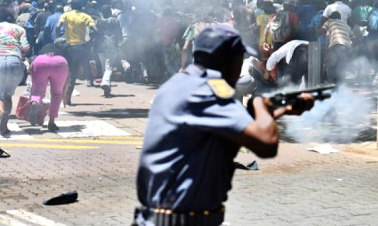 CREDIT: pretorianews.newspaperdirect.com
CREDIT: pretorianews.newspaperdirect.com
13 January
- Protests at varsities in Gauteng continue, with workers in Tshwane, shutting down institutions in the fight against outsourcing. In Johannesburg, FeesMustFall members say they are committed to the fight for free quality education and insourcing.
- UPrising releases a statement [116] on Facebook:
‘ ...The University of Pretoria will be closed tomorrow Thursday 14 January 2016. Talks with the relevant stakeholders regarding the worker's protest on insourcing is still ongoing.
Furthermore students and parents will be notified regarding Welcome Day on the Saturday 16 January 2016...’
UP students are not allowed access to campus.
- Student groups at Unisa, where the EFFSC has been prominent during this week's protests, accuse the EFFSC of political posturing. After a meeting between Unisa's Democratic Alliance Student Organisation (DASO), South African Students Congress (SASC), Pan Africanist Student Movement of Azania (PASMA) and ANC Youth League (ANCYL), the groups issued a joint statement that, ‘The meeting unanimously agreed that the ongoing strike is nothing but sheer opportunism on the part of the EFFSC and is aimed at boosting its public profile ahead of SRC elections’.
14 January
- UPrising releases statement [117] on Facebook:
‘It is with deep regret that the University of Pretoria will be closed tomorrow Friday 15 January 2016 due to the ongoing worker's protest. Furthermore Welcome Day for all first year students on Saturday 16 January 2016 will be cancelled too. Online registration for first years will commence on Monday 18 January 2016 the University of Pretoria will communicate with students on reopening. Lastly to all senior students Summer School for 2016 is cancelled and alternatives arrangements will be made.’
15 January
- UPrising statement [118] on Facebook:
‘...The University of Pretoria still remains closed. There are currently talks between management, workers and the relevant stakeholders on the implementation of insourcing. We hope the University will clear this matter urgently. UPrising still supports the workers and their plea.’
16 January
- A lengthily meeting takes place between management, workers and relevant stakeholders. No agreement is reached.
17 January
- UP releases a statement [119] :
‘This is a further update on developments related to the protest demand for the insourcing of contract workers.
...
The protesters have demanded immediate insourcing of all contract workers and a minimum salary of R10 000 per month. The University tabled a proposed phased approach to the insourcing of services linked to the expiry of existing contracts and in the interim has agreed to a “top up” of existing salaries. This is in line with similar agreements at several other universities such as Wits and UJ. Regrettably, this was rejected by the worker representatives and student representatives.
There are several complex issues to be considered including the fact that the University has long-term legal contracts with service providers and should these be cancelled, there would be significant financial penalties.
Nonetheless, we remain committed to continuing with the Commission on insourcing and a further meeting of the Commission has been scheduled...
- Author Department of University Relations’
- Speaking to the SABC, UP #OutsourcingMustFall member Mametlwe Sebei said,
“We are demanding that outsourcing must be immediately brought to an end. We are also demanding a minimum wage of R10 000 for every worker a month. The workers are actually saying we want to break with the system of the cheap labour wages. All forms of brutal exploitation that we have seen and we want a share in better life which until now has been enjoyed by a tiny elite at the top of our society.”
18 January
- Mediators , Stephan de Beer and Tshepo Madlingozi, release a statement [120] discussing recent events and suggest the University remove the two interdicts as they are concerned ‘about the fragile trust between parties’:
‘On Tuesday we were invited, with Professor Karin van Marle, to two meetings with the Vice Chancellor who requested us to mediate between the parties, a role we also played during the October 2015 ?#Feesmustfall? campaign as members of the UP Academic Staff Solidarity group.’
‘One of the matters that hinder trust is the interdict that the University attained, and now a second interdict. We would like to request the University to consider withdrawing the interdicts in order for the conversation to continue in good faith. Neither workers nor students are interested in violent protests. We do understand that the movement for insourcing goes beyond the University of Pretoria and that it is not only students and workers from our institution that are protesting. However, an interdict immediately raises walls instead of inviting conversation.
We heard numerous voices from workers and students articulating what they see as a lack of urgency on the part of management. They have a strong sense that management is merely playing delaying tactics through the Commission. Obviously homework needs to be done but the fact that this was not done between October 2015 when the Commission was agreed to and January, raise serious questions as to whether management sees in as urgent a light as the workers and students. Our perception over the past few days was that it was too easy to cancel or postpone a meeting based on technicalities or because of a lack of mandate.
A deep concern expressed by students and workers, and witnessed by ourselves, is an apparent lack of preparedness from the side of management for the work of the commission. We would have thought that management would have arrived with a list of companies, numbers of people employed, the difference between the contract amount and the actual salaries paid to workers, and so forth. Such a cost analysis as well as the University’s own internal home work on costs, affordability and sustainability should have been done between October 2015 and now. That would have empowered the commission to do its actual work. In the absence of such the commission was disempowered and the impasse just further delayed. Similarly, all documents such as recognition agreements between the University and trade unions, contracts with the outsourced companies and other relevant documentation should have been available already to make the commission functional. We are convinced that management would not go into a Council meeting of the University with such limited preparedness.
We are concerned with the content of some of the messages going out to the staff and regard it as misinformation. Workers are blamed for compromising the right of students to study. Of course, without having full information, staff and parents might actually accept such a narrative. Having listened to the harrowing narratives, one after the other, of workers, any language that would turn them, either deliberately or by default, into culprits or criminals, is unfortunate, and it compromises trust. It also suggests that management is not hearing the workers’ pain. We would like to urge that the content of communication to the university community should refrain from further victimizing and ‘otherising’ the workers.
In being requested to play a certain “mediation” role, in order to get the negotiations back on track and to avoid violence, we were struck by the following: a sense of panic almost bordering on paranoia, and a real obsession with technicalities overriding mere human interaction in humble and direct ways. We had a sense that trust was not given to workers or student leaders and therefore trust cannot be expected by management. The matter of trust runs through all that will make this process fail, or succeed. We are concerned for example with the cost of hiring additional riot security guards to be present whilst the Commission is in sitting, with no evident threat of violence in sight. It suggests a certain narrative about workers and students that runs contrary to our experience in talking with them. We caution that the presence of what could only be described as paramiltary private security on campus and in residences could further inflame emotions.
...
Lastly, for every day that workers are on strike they are not paid. This is unsustainable as some of the workers already earn as little as R 2,400 per month before deductions. Workers however are scared of returning to work as they fear victimization and need protection. It is our impression the refusal to return to work is based on genuine fear, and it is not merely a bargaining tactic. We are heartened by the proposal of the University to top-up the salaries of the outsourced workers as an interim measure while the commission undertakes its work expeditely and with due diligence. We thus urge workers and students to seriously consider this top up proposal.
20 January
- UP management signs an agreement to end outsourcing at UP and commit to insourcing.
- UPrising statement [121] :
‘After 9 days of protest concerning the insourcing of workers at the University of Pretoria we are glad to inform you that worker's and management have reached an agreement. It goes as follows:
1. Workers will receive a top-up that will have their final gross salary before deductions increase to the sum of R5500pm as of the end of this month. The amount of R5500 will increase gradually over the years so that it reaches R10000 by the end of 2018.
2. All staff will have access to the health clinic soon as it is sufficiently equipped to deal with the increased number and the altered demographic by the 1 March 2016.
3. All workers and their children, who qualify to study at the University of Pretoria will be allowed to study for free as applicable to other staff members.
4. Workers and students who participated in the protest will not be disciplined, dismissed or victimised. To ensure this an oversight committee will deal with any breach relating to this clause.
There are conditions to the implementation of this agreement, these being:
1. Workers must return to work as soon as the agreement is signed.
2. No further protest by any party.
3. UP will not enforce the interdict if workers return to work as agreed and protest action stops.
We hope the University abides by this agreement and the academic year can commence without any obstacles. We also trust that VC Prof. Cheryl de la Ray will also tend to the matters concerning the students memorandum signed in October 2015.
The University of Pretoria will be open tomorrow Thursday 21 January 2016. CSC will be open to all on Monday 25 January 2016 and the academic year commences on 1 February 2016.
Our parents have been dignified and we hope management will continue respecting them.
Aluta Continua
UPrising’
21 January
- EFF spokesperson, Mbuyiseni Ndlozi praised the EFFSC in a statement [122] for standing side by side with the outsourced workers, in continuing to fight against insourcing which started last year.
‘...In less than seven months of fighting the issue head on, they managed to achieve what NEHAWU has successfully failed to achieve in over two decades of representing workers...’
22 January
- UP releases statement [123] :
‘...the University management representatives and the Insourcing Task Team responsible for implementation of the agreement had its first meeting on 22 January.
Progress was made in terms of getting the insourcing process off the ground...’
29 January
- As per agreement signed on 20 January 2016, UP management representatives and the Task Team responsible for implementation of the agreement, have their second meeting chaired by the Vice-Principal, Prof Themba Mosia.
UP releases a statement [124] updating the public on progress made towards insourcing:
‘A full report on progress was submitted and discussed and a number of items were identified for further exploration.
The Task Team has ensured that all employees are paid for January 2016 and is working hard to make sure that the agreed upon salary top-up is implemented by February.
The Task Team will meet again within the next two weeks.’
- Afriforum UP releases a statement [125] saying they were removed from the meeting:
“When it was AfriForum’s opportunity to speak, members of the EFF started shouting and disrupting the meeting. They continued shouting that there was no place for ‘you’ (AfriForum) at the meeting. The UP Management then asked me to leave the meeting...” said Morné Mostert, AfriForum Youth’s National Project Coordinator.
AfriForum UP say they submitted a memorandum to De la Rey about the language policy and the #Feesmustfall campaign last year, and that De la Rey assured AfriForum UP that no organisation would be excluded from the consultation process.
“The EFF wants to change the University’s language policy under the cloak of the #Feesmustfall campaign. Management shouldn’t listen to only certain organisations. We will ensure that minorities on campus will also be heard,” Mostert also said.
1 February
- A few members of EFFSC UP occupy the CSC. EFFSC have been vocal about changing the language policy at UP.
The language policy was addressed in the FeesMustFall memorandum handed to the University last year. The University signed an agreement to address the issue. The Language Policy Task Team which was set up in February 2015 by the University Executive, ‘concluded the requested review in December 2015 and submitted its report to the University Executive and Senate on 26 and 27 January 2016, respectively. At the meeting on 27 January there was consensus in support of the key findings and recommendations of the task team.
The recommendations will now be submitted to faculties and student representative bodies for comment, where after it will be submitted to the University Council for consideration. Details of the proposed changes to the University’s language policy will be shared with staff and students during the course of the consultations that will be scheduled for this purpose.’
- A general meeting is planned for UPrising to discuss, ‘the way forward, projects and identity’. Meeting is planned to take place in Huis Erika. Students are evicted from meeting there and therefore a change of venue occurs.
2 February
- The EFFSC UP further pressurizes the University and accuses the University of using delay tactics to address the demands pertaining to the language policy. The organisation threatens to disrupt Afrikaans lectures on campus if Afrikaans is not abolished as a medium of instruction at the University.
“We will give them two weeks, and if no progress is made we are going ahead with the disruption of Afrikaans lectures... And we will remove Afrikaans signage on campus if this task team fails.”- EFFSC chairperson, Kabelo Mahlobogwane said.
Mahlobogwane also said that one of the strongest reasons to have classes in English only is economic. It is in acknowledgement of the financial climate in the country, in which there is a major existing shortage of affordable university education. Furthermore he argues that the dual language system perpetuates separation amongst students:
“Afrikaans is not economically viable as it means resources should be doubled up. We need more lecturers, translators, etc. The university spends about R100 million on Afrikaans each year. That money can be used to sponsor poor students. Afrikaans goes against the project of social cohesion as it creates two universities in one. Even aggravating the situation is the separation of students in class and residences but are one day expected to work together.”
- EFFSC has accused UP of continuing to perpetuate Afrikaaner cultural supremacy and undermining Black cultures on the campus. EFFSC UP has also accused the institution of giving students who have chosen to be taught in English a lower quality of tuition.
“Some students do not speak Afrikaans, but they have to subscribe to the cultural norms attached to it. We find that this is not fair because it alienates them. They are forced to take part in activities they are not familiar with because that is the culture of the university,” Mahlobogwane said.
The University has also been lauded for spending millions of Rand on maintaining Afrikaans as a medium of instruction every year when statistics released suggest only around 17% of students use Afrikaans as a medium of instruction. The EFFSC-UP argues that there are many financially needy students on the campus that could use the money as financial assistance.
The University’s spokesperson Anna-Retha Bouwer said: “The executive appointed the task team to review the current language policy in view of the rapidly changing student and staff demographics in recent years... The task team’s findings will be submitted to faculties and student representative bodies for comment, before being submitted to the council for consideration.”
Bouwer, also dismissed the EFFSC’s claims that classes offered in English were of a lower quality to that of classes presented in Afrikaans.
“Tuition offered in English and Afrikaans is of the same quality and there are lecturers who offer classes in both English and Afrikaans,” Bouwer said.
“There is a problem when the language of one culture is removed at the cost of another… the EFFSC should present evidence [and do it through the proper channels]”, said AfriForum spokesperson Ian Cameron.
He added that AfriForum would urge students in Afrikaans classes to ‘defend’ themselves against any potential violence if the EFFSC are to act on their demands.
“We will also be willing to represent and provide legal assistance to those students.” Cameron said.
4 February
- EFFSC UP Facebook statement [127] :
‘We are moving to stage 2. Complete campus shutdown! We demand that UP implements the promises they made during ?#FeesMustFall?Accommodation and Registration on the top of our Agenda.’
16 February
- Details of the proposed changes to the university’s language policy are set to be shared with staff and students during the course of consultations that are to be scheduled.
The Task Team has proposed amendments to the institution’s language policy, which are set to be tabled in a meeting with the student groups, UPrising, Sasco and the EFFSC-UP, on Thursday, 18 February and Afriforum on the following day.
- The proposals include that English be the primary language of instruction in all lectures, and that Afrikaans and sePedi be used to provide additional support to students in tutorials and practicals.
The University said the following about the language policy revision proposals, ‘To promote multilingualism and student success it is proposed that Afrikaans and sePedi be used to provide additional support to students.
Changing the language policy is a statutory process. These proposals have been supported by consensus of the senate and will be considered by the council. Any changes to the language policy also have to be submitted to the Minister of Higher Education and Training’.
18 February
- The consultation meeting between the Task Team and the student groups UPrising, Sasco and the EFFSC-UP is disrupted by a group of pro-institutionalised Afrikaans students and elder members of Afriforum. Violence continues to ensue between different groups, and the University says the meeting can no longer proceed. Staff and students are requested to forward their input to the task team through email instead.
- Perdeby reports the following on the events that took place:
‘On 18 February, violence broke out on UP’s Hatfield campus following mass protest action by members of Afriforum Youth, EFFSC-UP, Sasco and the Progressive Youth Alliance (PYA). A private meeting scheduled for 14:30 at the Sanlam Auditorium in which UPrising, Sasco and the EFFSC-UP were to debate UP’s language policy had to be cancelled after a large number of students, including members from Afriforum Youth, gathered outside the venue in support of UP keeping Afrikaans as a tuition language at the university.
EFFSC-UP secretary general Wenzile Madonsela describes how she and other students endured insults, were sworn at and battered with racial slurs by Afriforum members. According to Madonsela, they were blocked in and subsequently attacked by Afriforum...An email from Prof. Norman Duncan, Vice-Principal of academics and chairperson of the UP language policy task team, said that the meeting, which was supposed to be held that day, was not open to the public but was only for representatives of the SRC, the UPrising central committee and EFFSC-UP.
Students, however, received messages and read on social media about the event. Afriforum Youth chairperson Marthinus Jacobs explained the situation as confusing. Jacobs said, “We started gathering at the entrance to the Sanlam Auditorium [but] security wouldn’t let anyone in.”
According to Jacobs, Prof. Themba Mosia, Vice-Principal of student affairs and residences, came outside and addressed students. “He [Prof. Mosia] said that he didn’t understand why so many people pitched [to the debate] because as far as he knew this was a closed event,” explained Jacobs.
After several scuffles outside the venue between students in support of and against Afrikaans as a medium of instruction, members of Afriforum Youth marched to the Administration Building and handed over a memorandum demanding that Afrikaans be protected at UP to the Registrar, Prof. Niek Grové.
Members of Sasco, EFFSC-UP and the PYA began their own protest, starting at the student centre and moving to Engineering 1. EFFSC-UP’s Amogelang Monageng announced that students supporting the #AfrikaansMustFall movement would disrupt classes at UP. “The university must cut the budget [for expenditure on Afrikaans resources] and redirect those funds to the students and those who are suffering,” added Amogelang. The protesters made their way into the Engineering 3 building, forcing their way through security staff into the lecture halls.
It was at the entrance of the HSB where several violent encounters ensued between the protesting students and security guards. Students in the HSB were prevented from exiting, while security battled to contain the violent behaviour ensuing outside. Students threw rubbish at security guards and the pro-Afrikaans group. Pro-Afrikaans protesters released pepper spray on those protesting for the change of UP’s language policy.
The situation flared up when a large group of pro-Afrikaans students formed a barricade around student protesting for the removal of Afrikaans. Security guards, who repeatedly had to separate the two groups of students, used chain formations to prevent the groups from clashing. The violent flares continued in the Student Centre when the two groups confronted each other yet again, sending security running to break them up.
According to a statement by [De la Rey] , the report for the revision of UP’s language policy had been discussed with the Senate on 27 January and is currently being discussed with students and faculties. After the consultation process, UP’s Council will consider any proposals on the future language policy. “Implementation of any changes [would be] in compliance with the relevant statutory matter that must be submitted to the Minister of Higher Education and Training,” added [De la Rey] .
In a Facebook statement by the EFFSC-UP, they explained that they felt that Afrikaans at UP was not economically viable, disadvantaged the majority, and that it went against the project of social cohesion as it created two universities in one. “Afrikaans will fall because it is not used as just a language of tuition, but continues to be used like in the past … it is used to exclude and create some sort of superiority … [and] remind people of how it was used to oppress,” the statement added.
Proposed amendments to UP language policy
UP listed four proposed changes to its current language policy which students and staff could give feedback on. These proposed amendments include are:
• English should be the primary language of instruction in all lectures.
• UP should promote multilingualism as a means of facilitating student success and building social cohesion.
• Afrikaans and SePedi should be used to provide additional support to students in tutorials, practicals and discussions.
• Transitional arrangements will be put in place should the proposed amendments be accepted.
SRC secretary Donovan du Plooy said that the SRC “supports English as the only language of instruction at the institution”. Du Plooy also raised the concern that Afrikaans class attendance has decreased and that “it costs the university in excess of R100 million per annum [to present] Afrikaans as a language of tuition at UP.’
- UP obtains an urgent court interdict against Afriforum, Afriforum Youth and the EFFSC-UP, to prevent the parties from disrupting UP operations. The interdict prohibits the two organisations from any unlawful protest and disruption of academic activities at the institution.
19 February
- Hatfield and Groenkloof campuses still remain closed for the day.
#Tuksshutdown is trending on Twitter.
The University said, ‘...The closing of the campuses is in the interests of students and staff, this is due to threats to disrupt academic activities. The University will also allow a consultation process over language policy to continue...’ in a statement released today.
- A body of about 200 students begin protesting at Prospect Street gate. They request to be allowed into the premises to engage with University management.
They then move to a occupy Hatfield Studios.
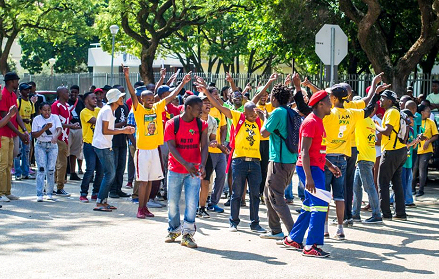 CREDIT: Shen Scott Image source
CREDIT: Shen Scott Image source
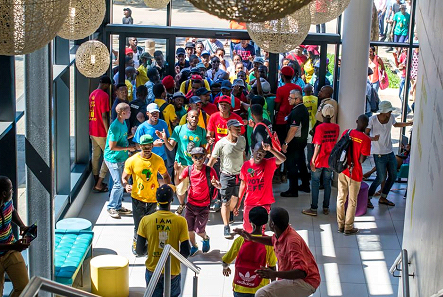 Protesting students move to occupy Hatfield studios. 19 February 2016. CREDIT: Shen Scott Image source
Protesting students move to occupy Hatfield studios. 19 February 2016. CREDIT: Shen Scott Image source
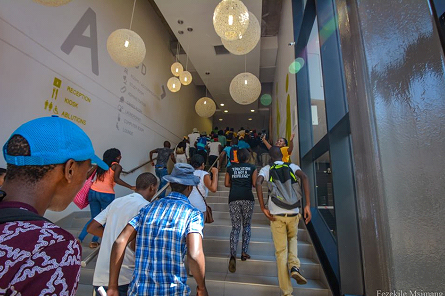 Protesting students move to occupy Hatfield Studios. CREDIT: Fezekile Msimang Image source
Protesting students move to occupy Hatfield Studios. CREDIT: Fezekile Msimang Image source
- Most students’ political organisations are present. Students manage to slip into Nerina courtyard after a truck. Protesters only allow female members to enter the female residence and occupy it.
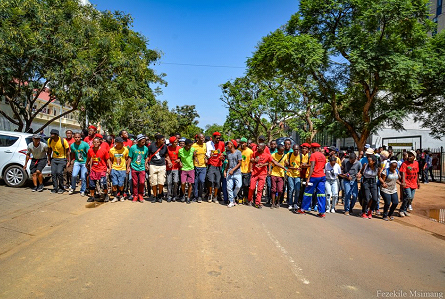 CREDIT: Fezekile Msimang Image source
CREDIT: Fezekile Msimang Image source
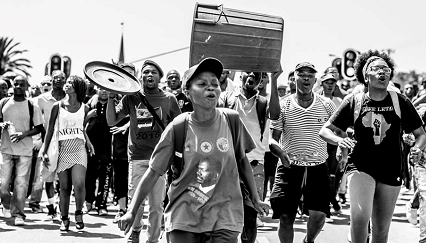 Student protesters then make their way to Lynnwood Road. CREDIT: Shen Scott Image source
Student protesters then make their way to Lynnwood Road. CREDIT: Shen Scott Image source
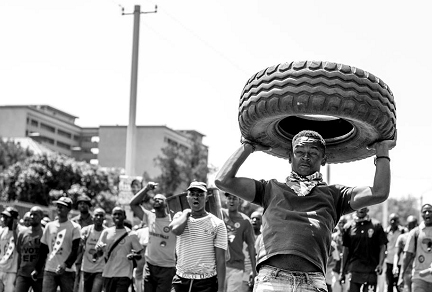 A tyre was found at the Nerina residence. A Military Hippo, also known as a Nyala, arrives on Lynwood road. CREDIT: Shen Scott Image source
A tyre was found at the Nerina residence. A Military Hippo, also known as a Nyala, arrives on Lynwood road. CREDIT: Shen Scott Image source
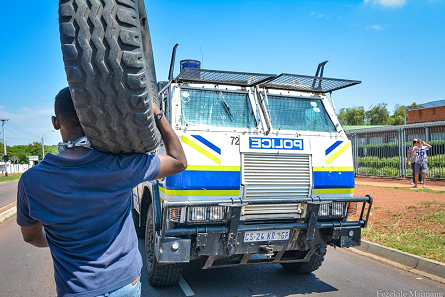 CREDIT: Fezekile Msimang Image source
CREDIT: Fezekile Msimang Image source
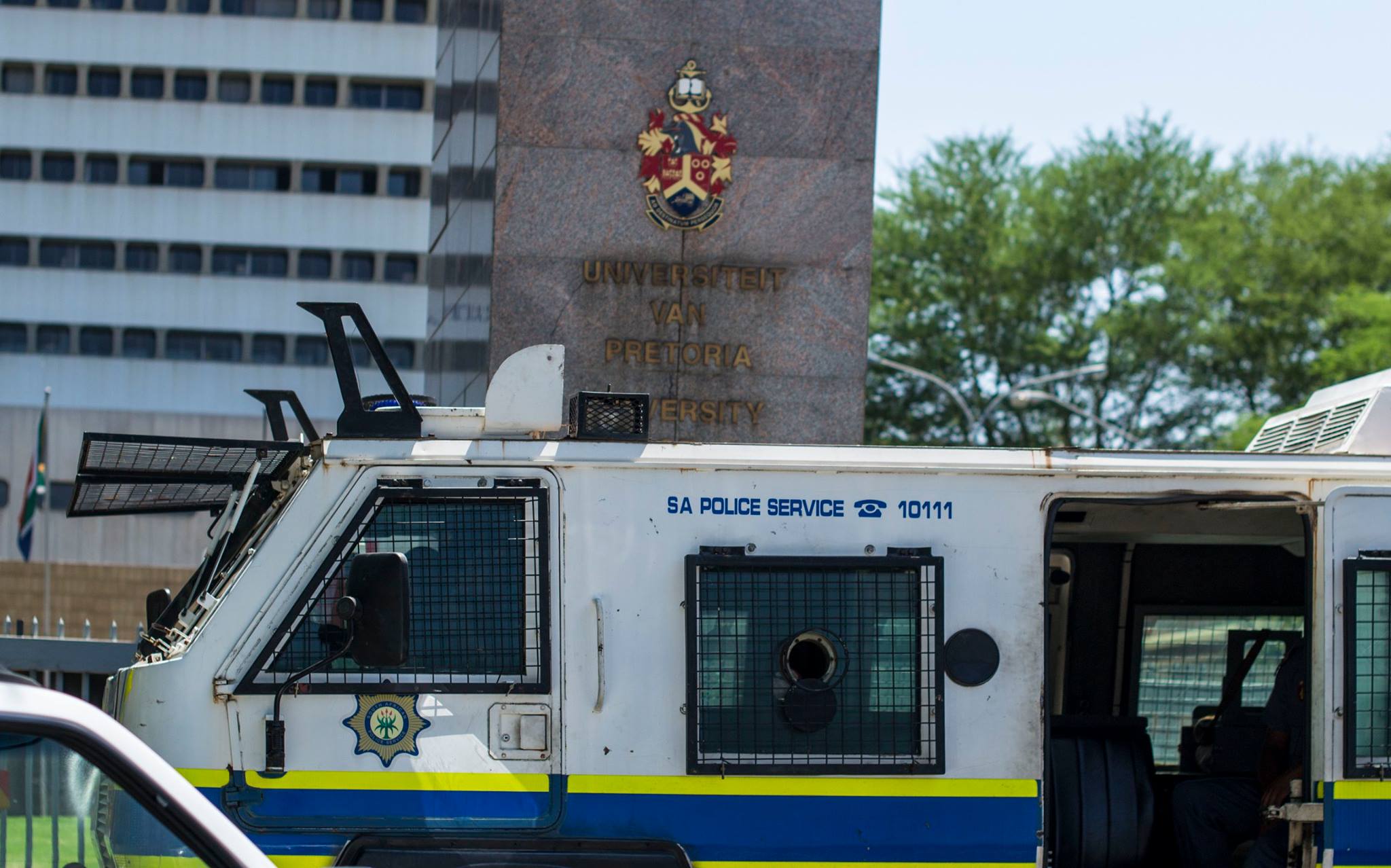 Protesters sing in front of the University of Pretoria’s main gate. 19 February 2016. CREDIT: Shen Scott Image source
Protesters sing in front of the University of Pretoria’s main gate. 19 February 2016. CREDIT: Shen Scott Image source
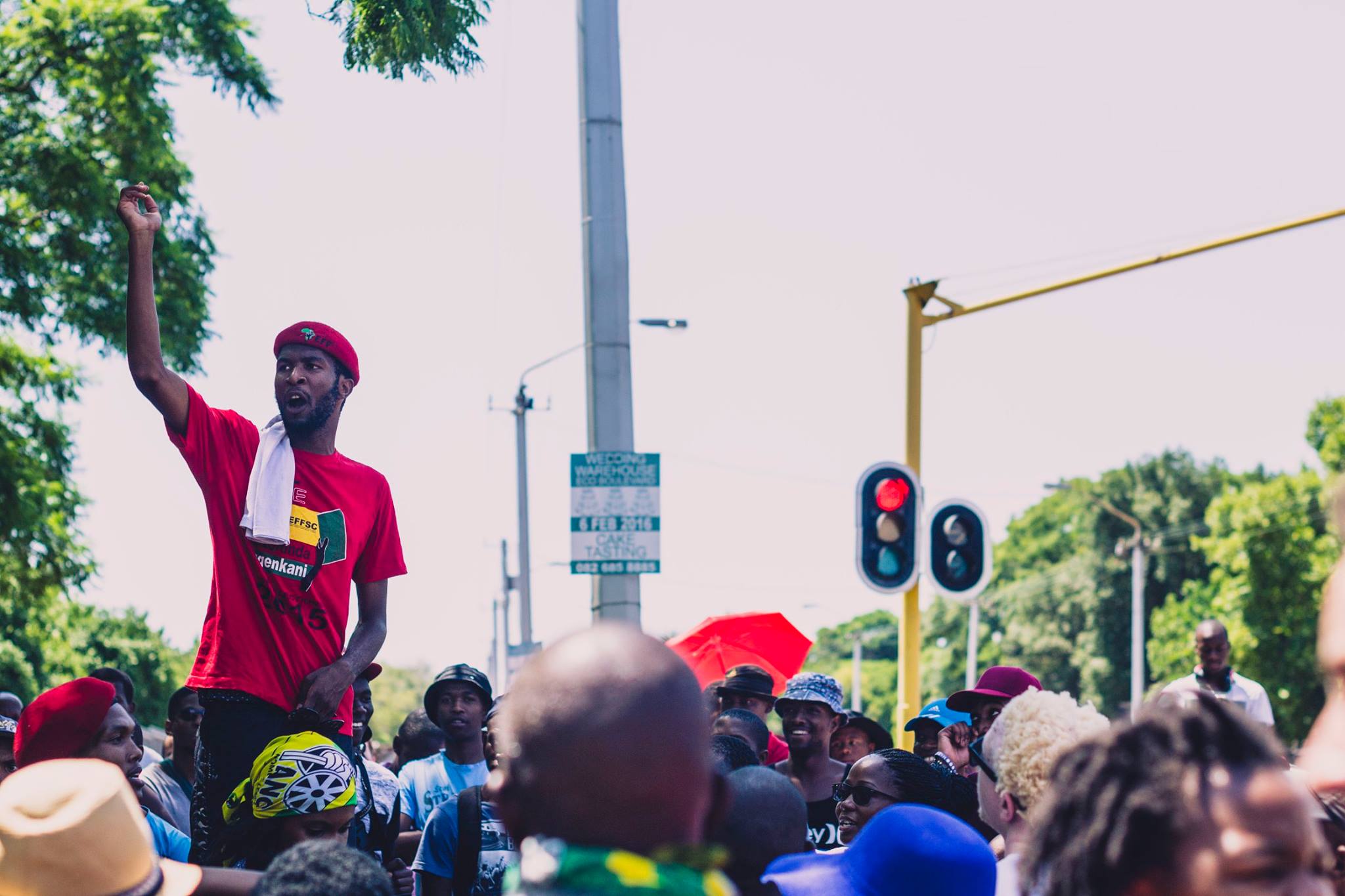 Leadership addresses the crowd. CREDIT: Shen Scott Image source
Leadership addresses the crowd. CREDIT: Shen Scott Image source
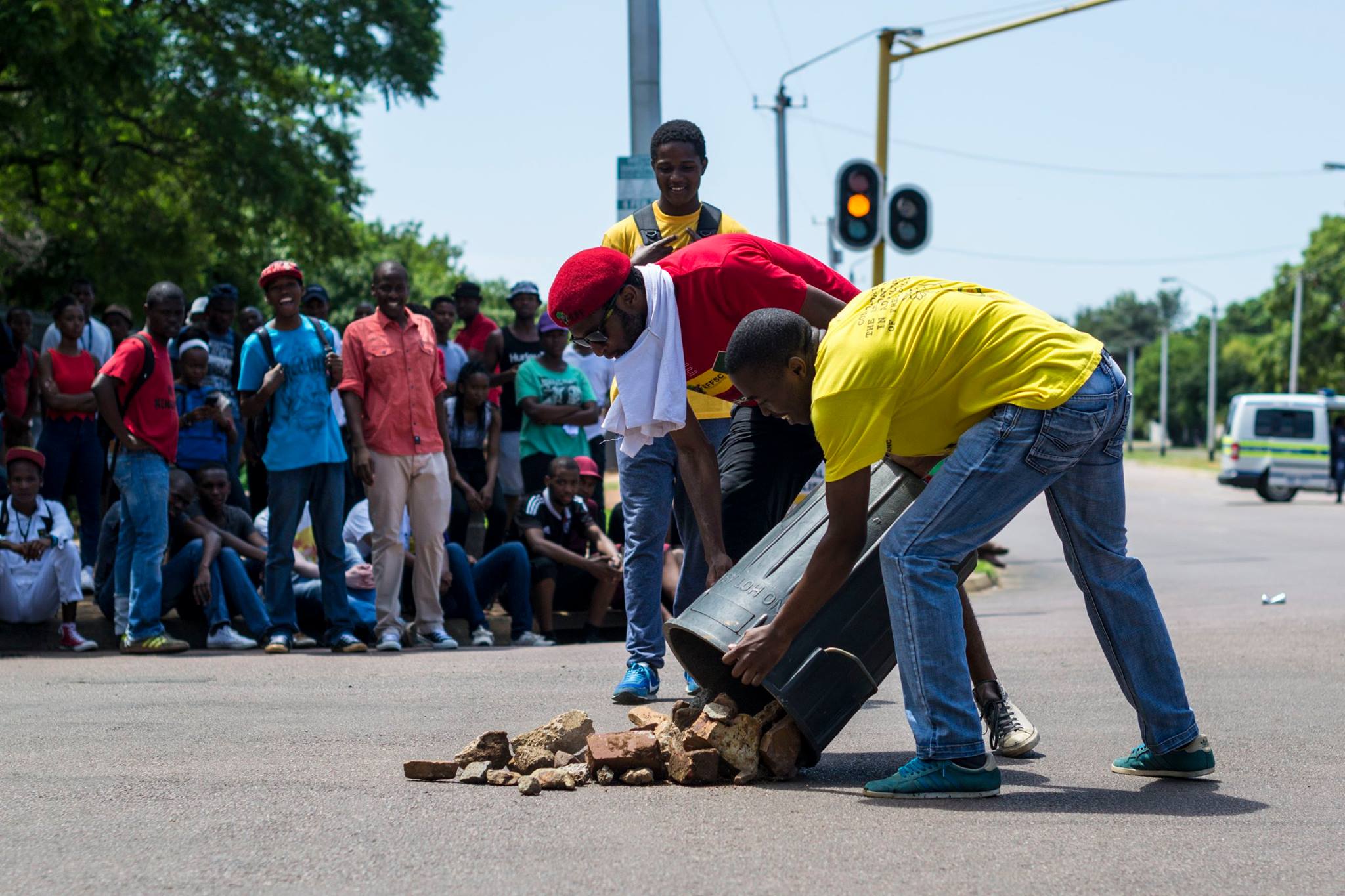 Protesters begin gathering stones to make a fire. CREDIT: Shen Scott Image source
Protesters begin gathering stones to make a fire. CREDIT: Shen Scott Image source
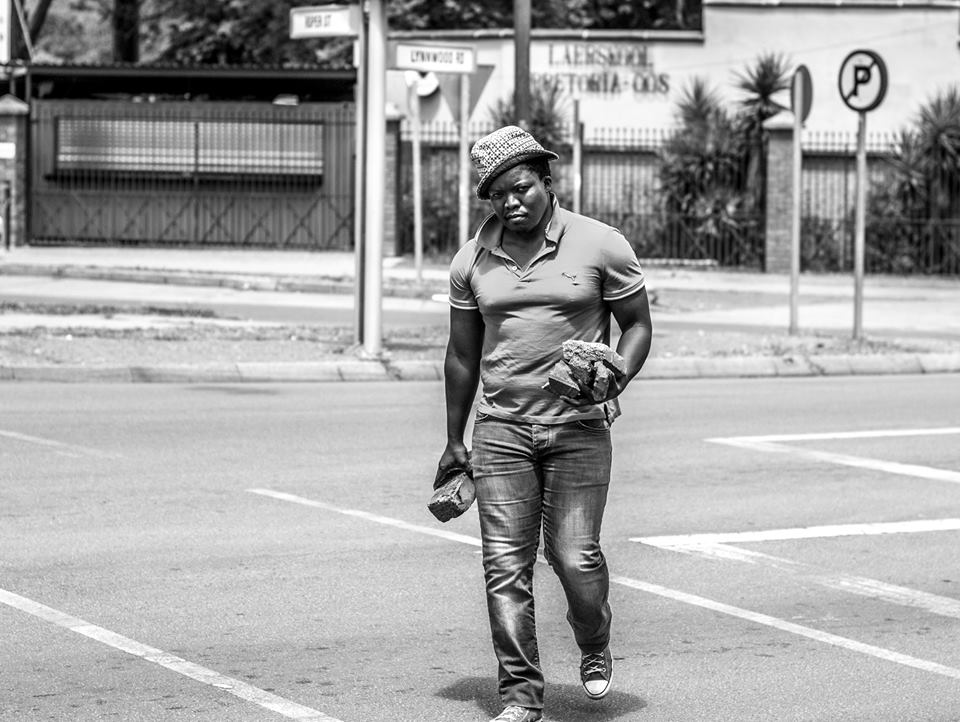 CREDIT: Shen Scott Image source
CREDIT: Shen Scott Image source
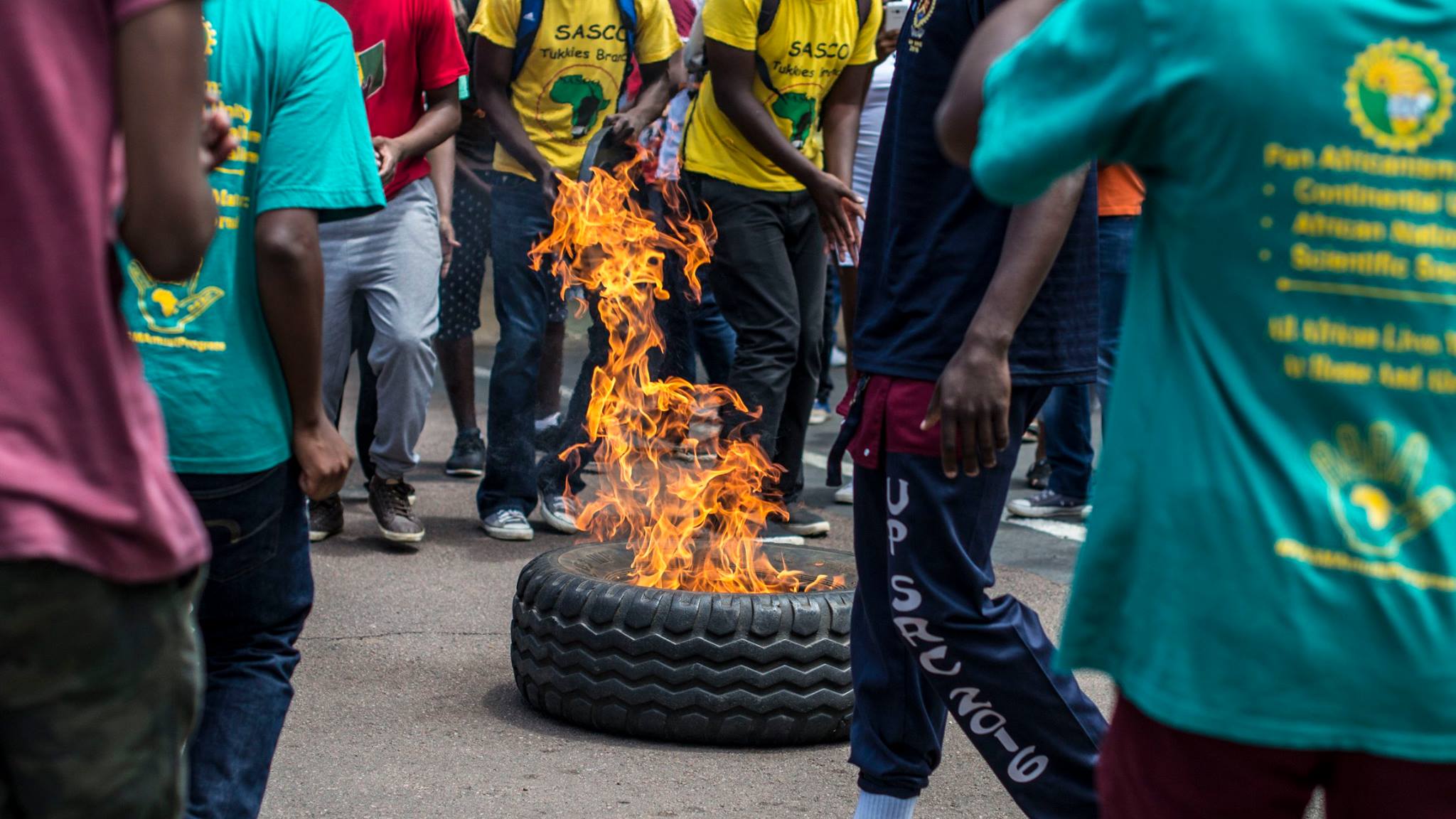 The tyre is set on fire outside the Main Gate. CREDIT: Shen Scott Image source
The tyre is set on fire outside the Main Gate. CREDIT: Shen Scott Image source
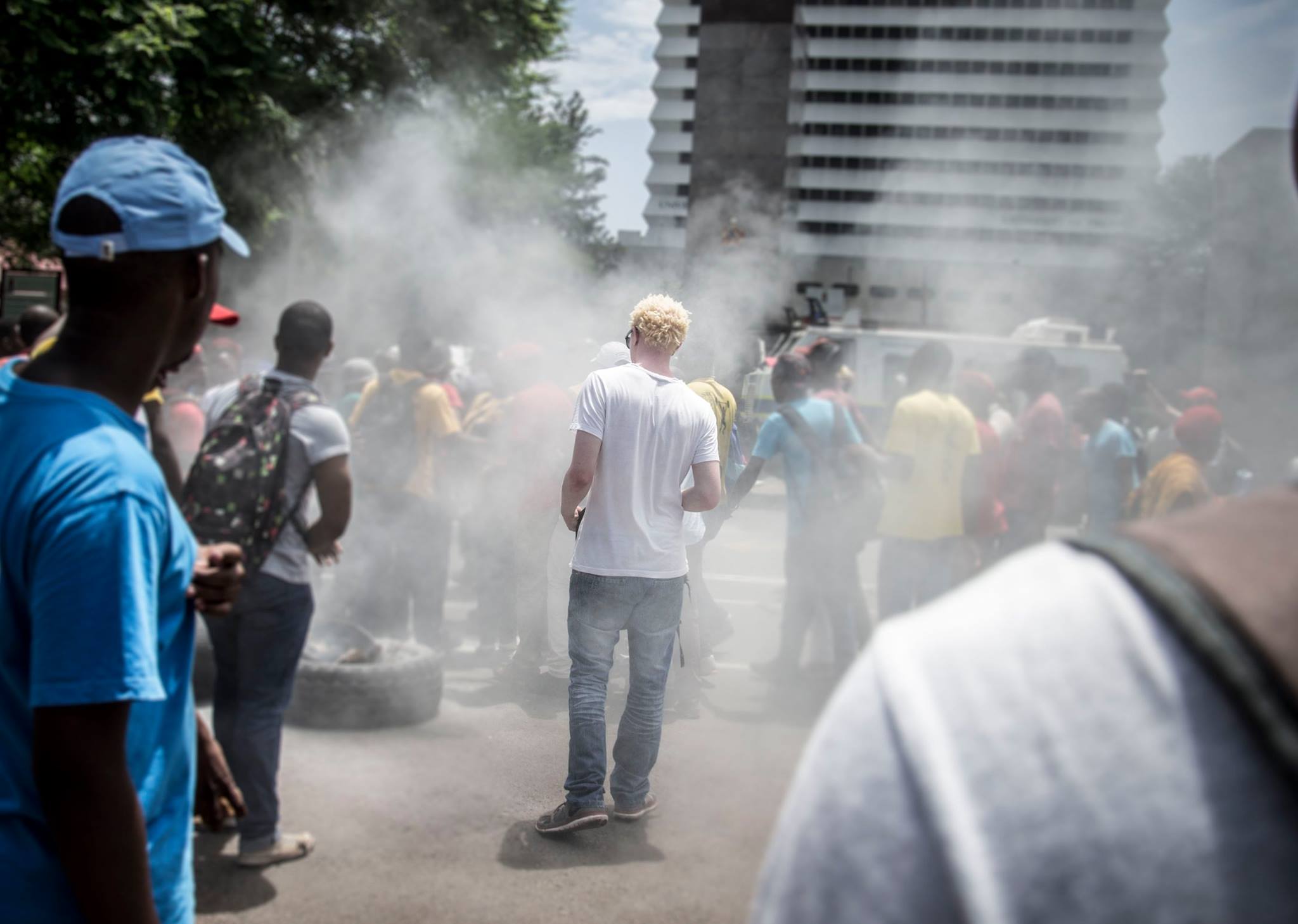 Police quickly extinguish the fire. CREDIT: Shen Scott Image source
Police quickly extinguish the fire. CREDIT: Shen Scott Image source
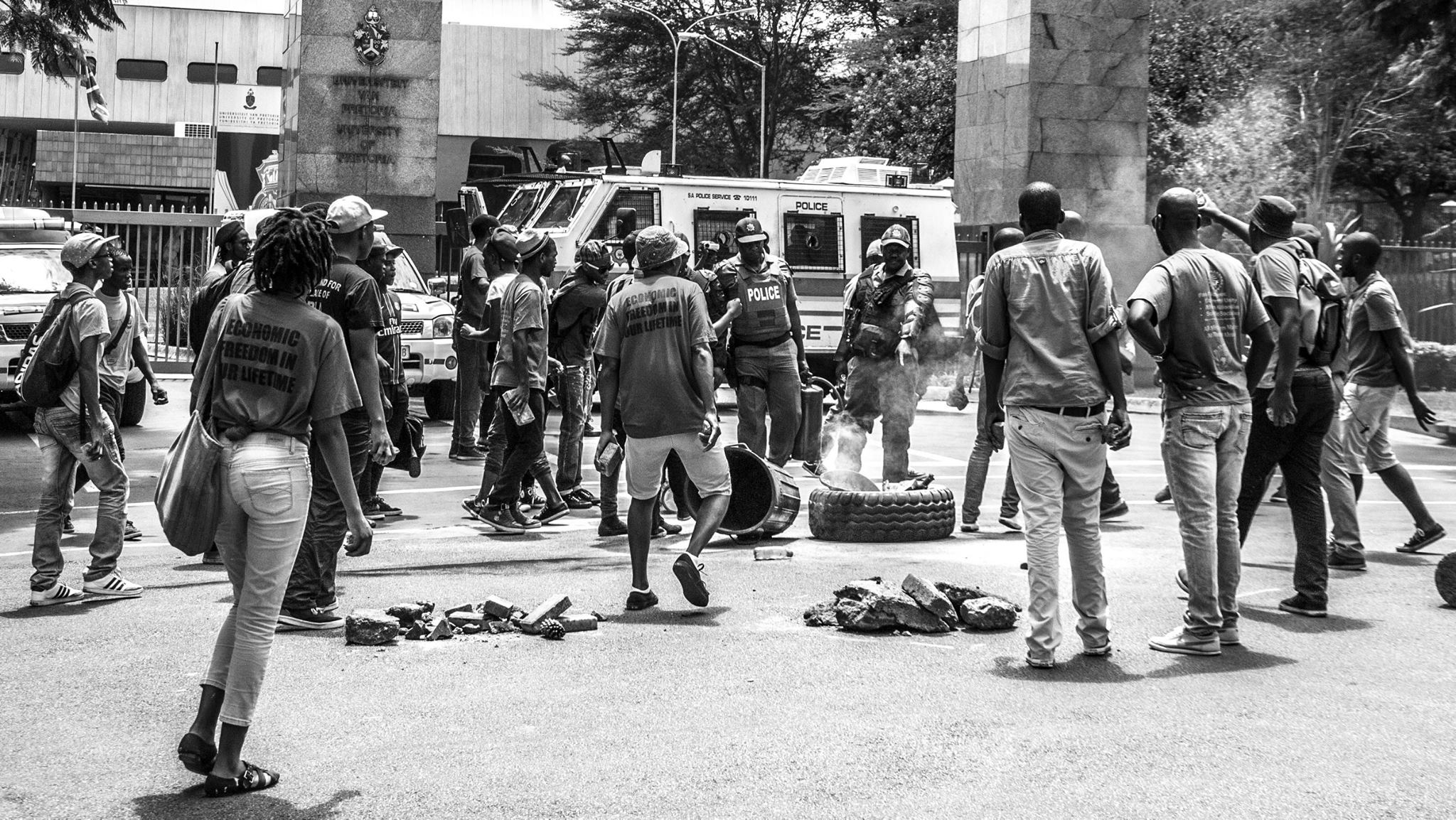 Protesting students and police confront each other. CREDIT: Shen Scott Image source
Protesting students and police confront each other. CREDIT: Shen Scott Image source
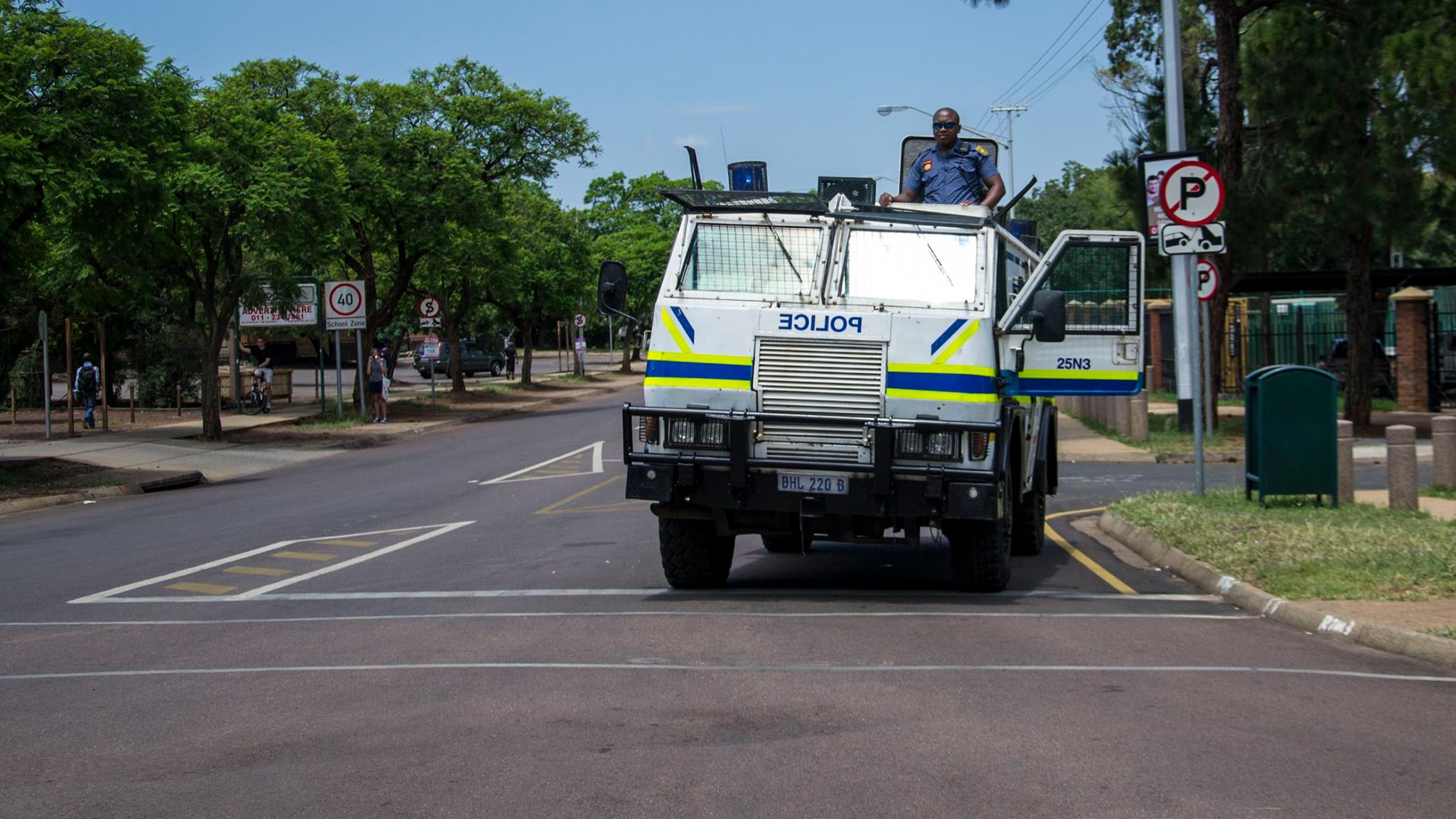 A second Nyala arrives on the scene. Image source
A second Nyala arrives on the scene. Image source
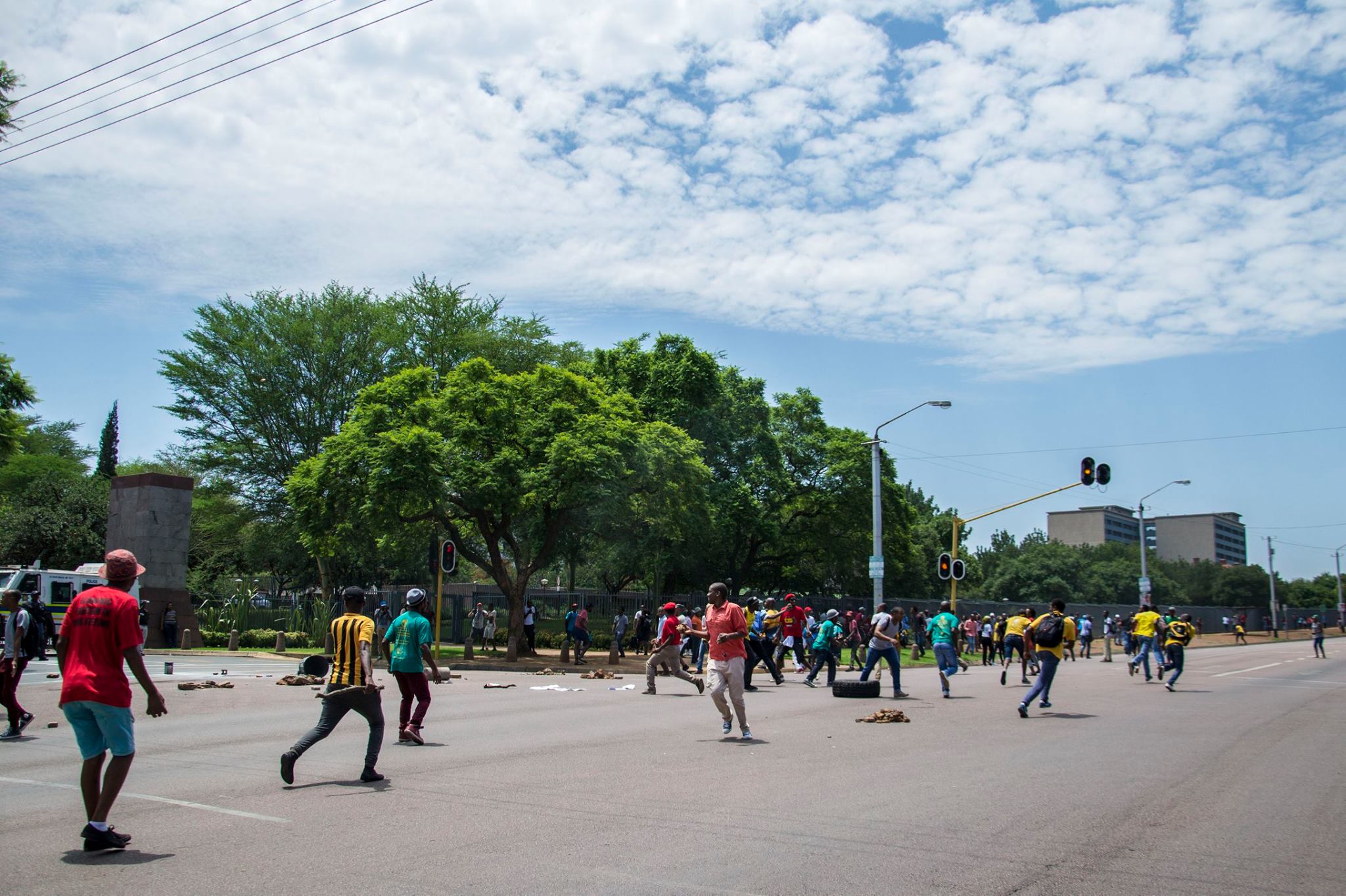 Police begin firing rubber bullets at the protesters Image source
Police begin firing rubber bullets at the protesters Image source
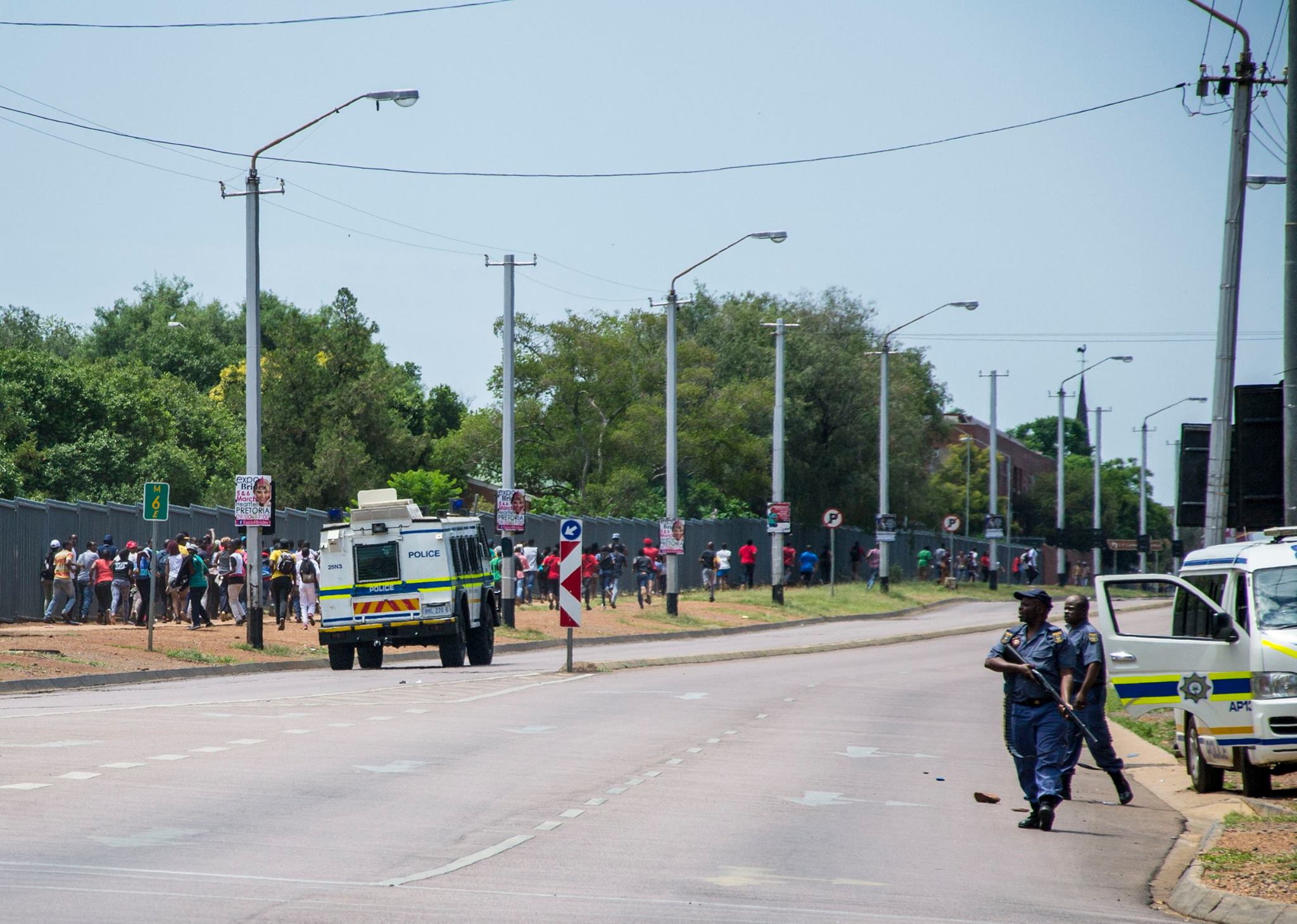 Police shoot rubber bullets at protesting students at the University of Pretoria. 19 February 2016. CREDIT: Shen Scott Image source
Police shoot rubber bullets at protesting students at the University of Pretoria. 19 February 2016. CREDIT: Shen Scott Image source
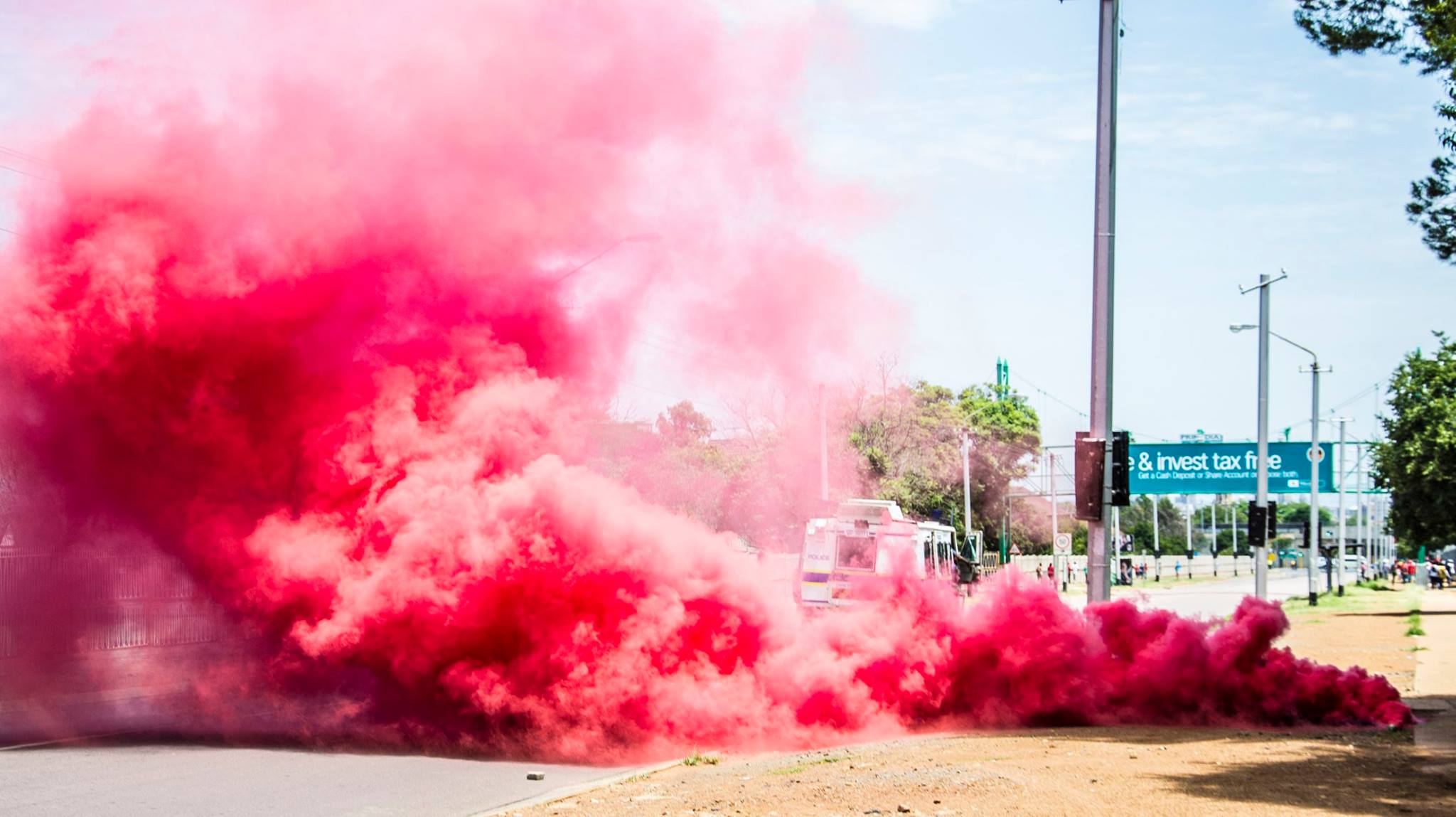 Red marker gas is dropped and nyala pursues protesters fleeing in opposite direction. CREDIT: Shen Scott Image source
Red marker gas is dropped and nyala pursues protesters fleeing in opposite direction. CREDIT: Shen Scott Image source
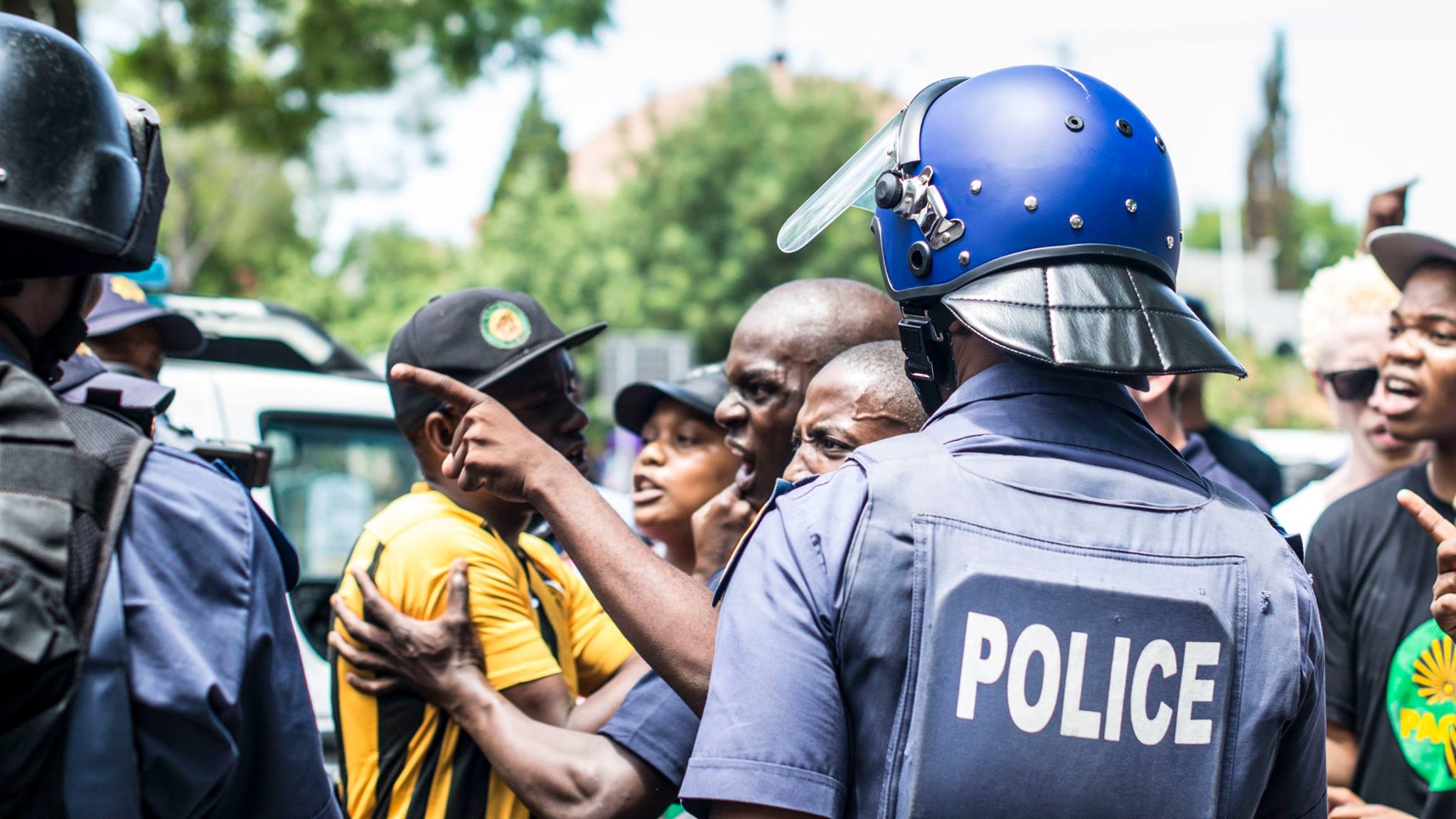 A nyala returns with arrested protesters while remaining protesters plead for the release of those arrested. Accusations have been made by the some of the student organisations involved, that police targeted student leaders with the assistance of the University. CREDIT: Shen Scott Image source
A nyala returns with arrested protesters while remaining protesters plead for the release of those arrested. Accusations have been made by the some of the student organisations involved, that police targeted student leaders with the assistance of the University. CREDIT: Shen Scott Image source
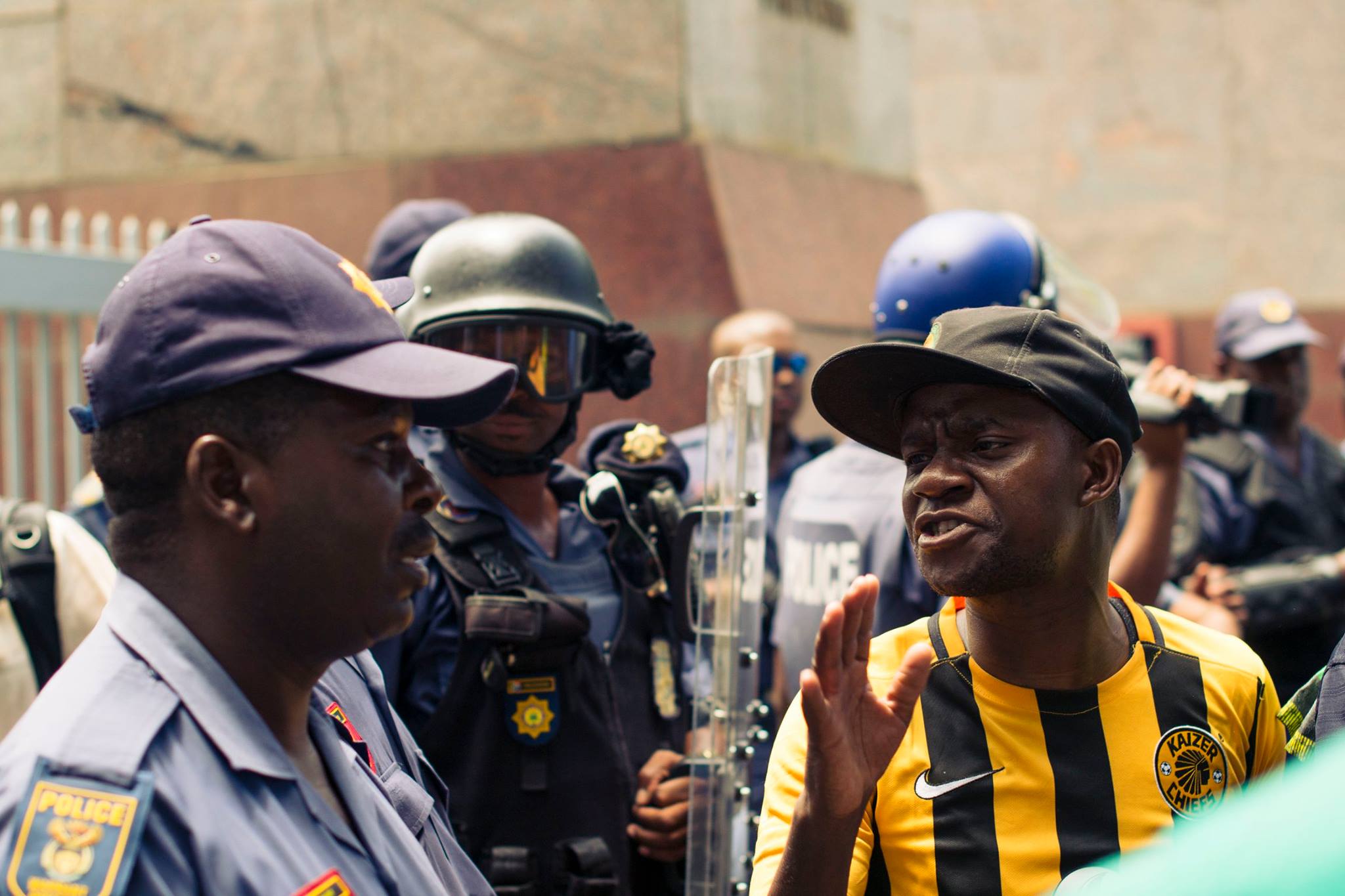 CREDIT: Shen Scott Image source
CREDIT: Shen Scott Image source
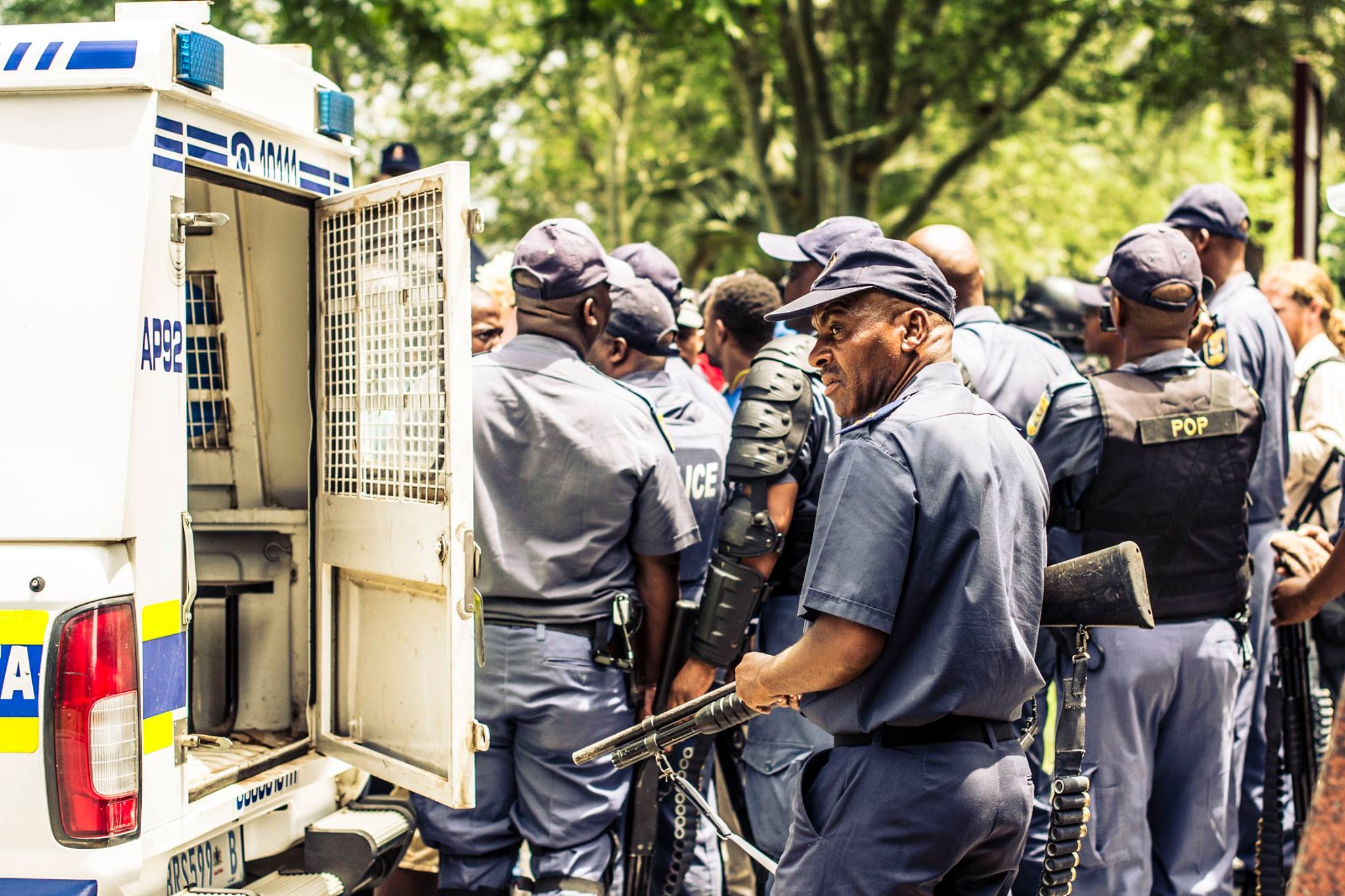 The remaining protesters decide to make their way to the police station to ask for the release of those arrested. On the way police let off stun grenades and fire rubber bullets and make more arrests. CREDIT: Shen Scott Image source
The remaining protesters decide to make their way to the police station to ask for the release of those arrested. On the way police let off stun grenades and fire rubber bullets and make more arrests. CREDIT: Shen Scott Image source
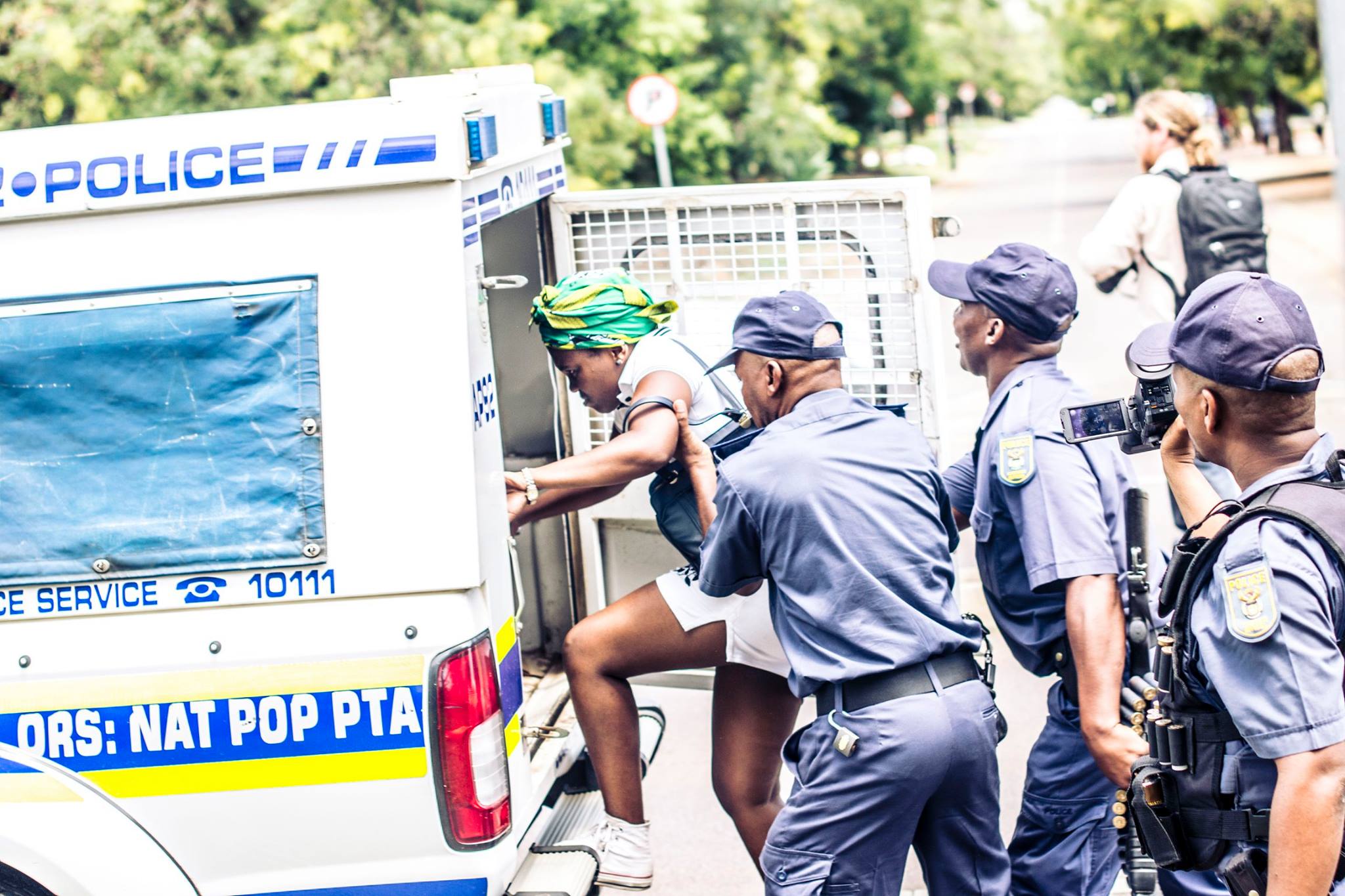 CREDIT: Shen Scott Image source
CREDIT: Shen Scott Image source
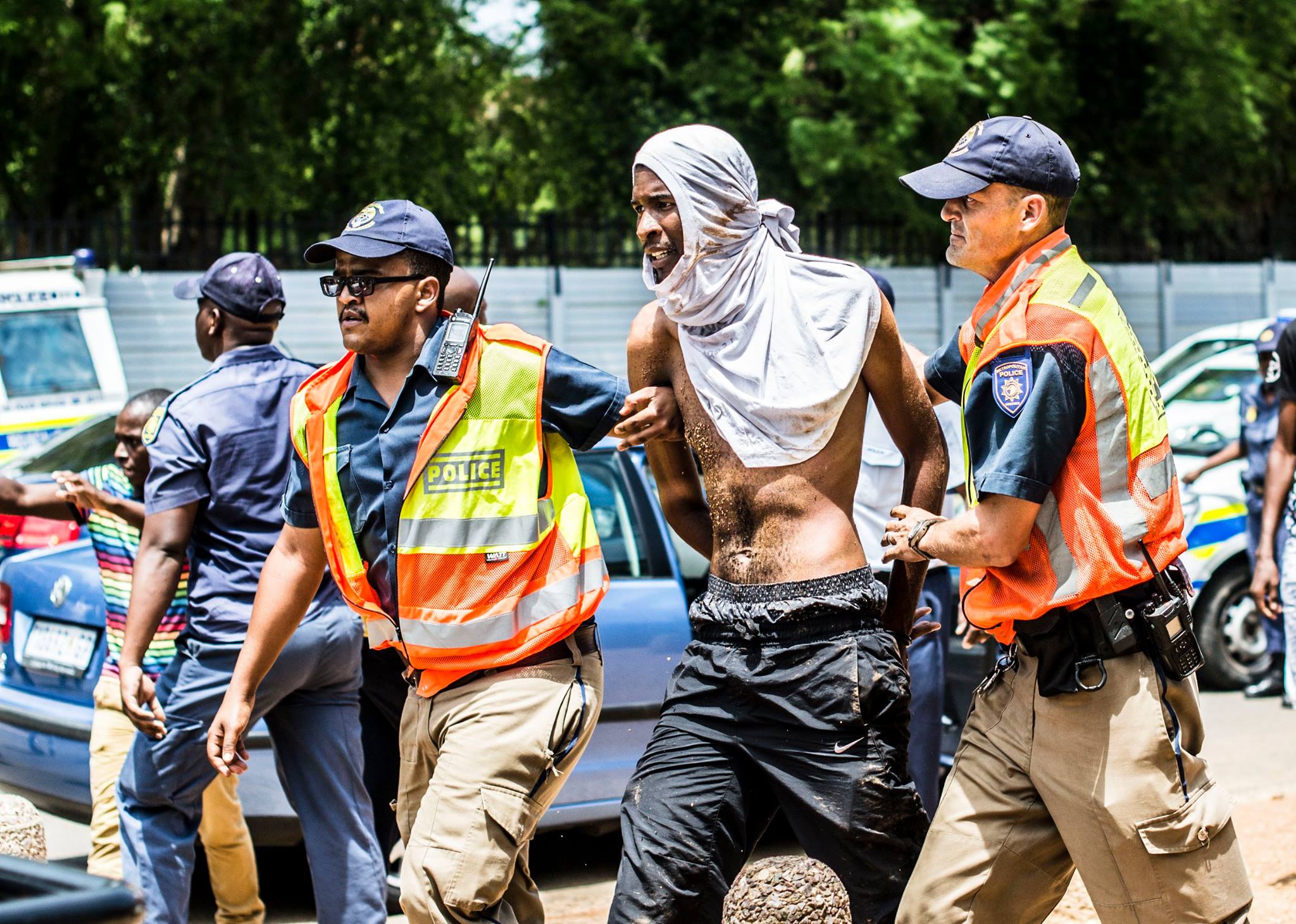 After being pursued directly by police, EFFSC-UP leader, Amla Mingose Nagih, is arrested and brutalised by police. CREDIT: Shen Scott Image source
After being pursued directly by police, EFFSC-UP leader, Amla Mingose Nagih, is arrested and brutalised by police. CREDIT: Shen Scott Image source
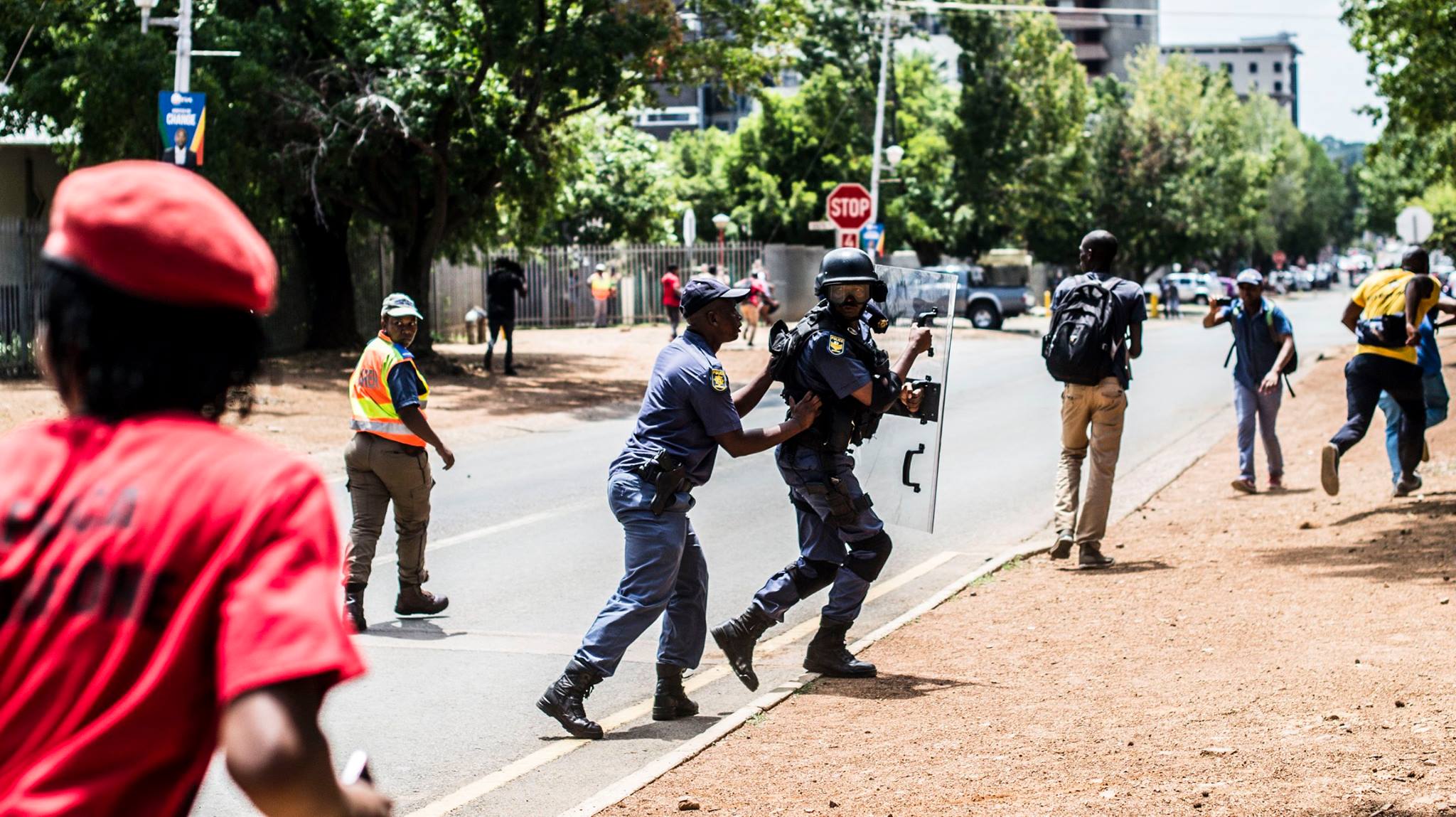 At the police station several protesters run out the police van and attempt to escape. Police fire more rubber bullets and pursue the escapees. Police arrest some of those who escaped and others, including members of leadership. CREDIT: Shen Scott Image source
At the police station several protesters run out the police van and attempt to escape. Police fire more rubber bullets and pursue the escapees. Police arrest some of those who escaped and others, including members of leadership. CREDIT: Shen Scott Image source
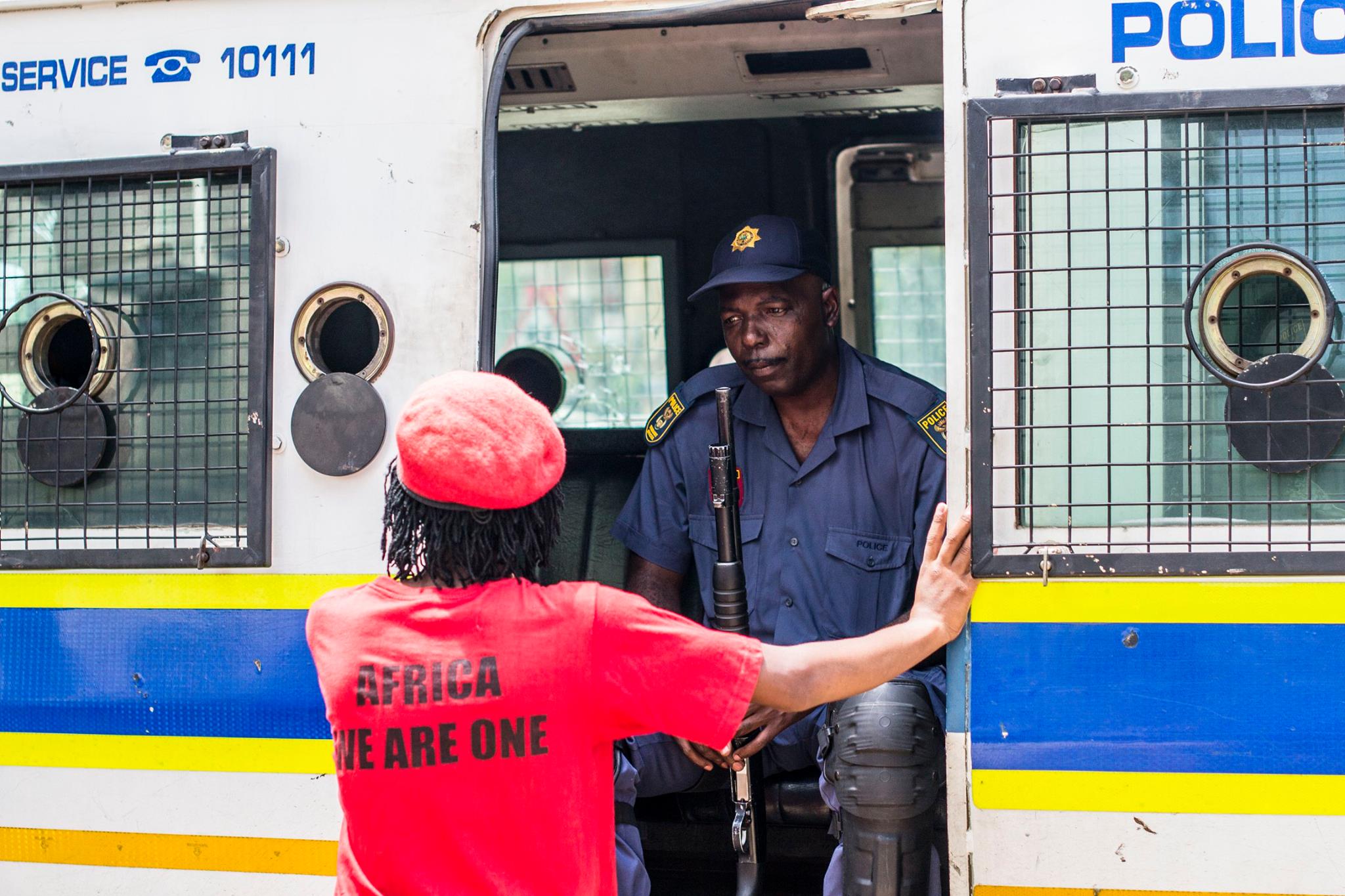 A policeman and protester speak calmly with one another amidst a confrontation between police and protesters at the University of Pretoria. 19 February 2016. CREDIT: Shen Scott Image source
A policeman and protester speak calmly with one another amidst a confrontation between police and protesters at the University of Pretoria. 19 February 2016. CREDIT: Shen Scott Image source
#TuksShutdownpic.twitter.com/5HZEts08aK
— EWN Reporter (@ewnreporter) February 19, 201622 February
- AfriForum representatives meet with De la Rey, for discussions following the wave of protests against the University's language policy and language policy review.
- "During the meeting various issues of importance and the immediate continuation of the academic programme at the university were discussed. AfriForum was given the assurance that a final decision regarding Afrikaans as language of instruction has not yet been taken," said Kallie Kriel, CEO at Afriforum .
He said De la Rey had agreed to organise a meeting between AfriForum and the University’s language Task Team in order to provide the organisation with an opportunity to give its input on language policy, before the matter would be referred to the University Council for a final decision.
- It is the first day the #Tuks27 are scheduled to appear in court. Students in support of Tuks27 and their cause have arranged buses to transport them from the campus to the court to protest for their release.
Before the students depart they disrupt academic activity on campus, as the University attempts to re-open.
Three arrested members of the Tuks27 have had charges against them dropped. The court case is postponed till 7 April 2016.
Later, after the students return from protesting outside the court, a highly racialised conflict ensues on campus as security works to keep groups apart. Several people are injured from the conflict.
At the end Afriforum members leave the campus and high levels of security and police remain with remaining students.
Perdeby reports on the events that took place:
‘On 22 February UP reopened its gates, but was soon closed again following disruption of classes by protesting students.
Students wore black to campus in support of #UPBlackMonday and the #Tuks27, social media campaigns launched in light of the 27 students arrested by the police, four of whom were charged with public violence and malicious damage to property.
Students comprising of EFFSC-UP, Sasco, PYA, UPrising and SRC members gathered at 07:30 outside the Prospect Street gate and began filing into campus. They began shutting the university down by entering several lecture halls and disrupting classes. UP deployed private security in an attempt to stop the students from entering lecture halls. Students and security clashed inside the EMB building, where security used tasers to contain protesters, and eventually students moved outside where Rowan Watson, manager of investigations at UP, was assaulted by a student who hit Watson in the face.
Students then moved through campus and split into two groups. One group continued toward the Engineering buildings, where they struggled to gain access to the building, while the other marched toward the Thuto building where they continued to disrupt classes.
The two groups met at the Thuto building, after which they proceeded via buses, which were arranged by the students, to the court hearings of those arrested and charged on Friday. Students sang and danced at the court in support of the students who had been charged.
The case was postponed to 7 April and students subsequently returned to campus.
Once on campus, student leaders planned to go to the Amphitheatre to debrief protesters on the way forward, but the group was met by a line of students protesting against the abolishment of Afrikaans, headed by Afriforum Youth, whose members formed a line blocking the protesting students from marching to the amphitheatre.
A standoff ensued, with UP security forming a line between the two groups as tensions flared....
Police arrived on campus with riot gear and a RG12 Nyala riot control vehicle. Eventually students who wanted to go to the Amphitheatre were given a path through the pro-Afrikaans supporters to do so, but as students moved toward the Amphitheatre, a fight occurred which resulted in pro-Afrikaans students chasing students against Afrikaans toward the Amphitheatre.
Anti-Afrikaans protesters began throwing rocks at pro-Afrikaans students, leaving a security guard and student injured. Another standoff occurred until the pro-Afrikaans students eventually dispersed.
Police remained on campus as students moved to the Amphitheatre and began singing and discussing their demands. A memorandum of demands was drafted (see photos on the Perdeby Facebook page). It was expected that the list of demands would be handed over to UP management on Wednesday.
UP remains closed until further notice.’
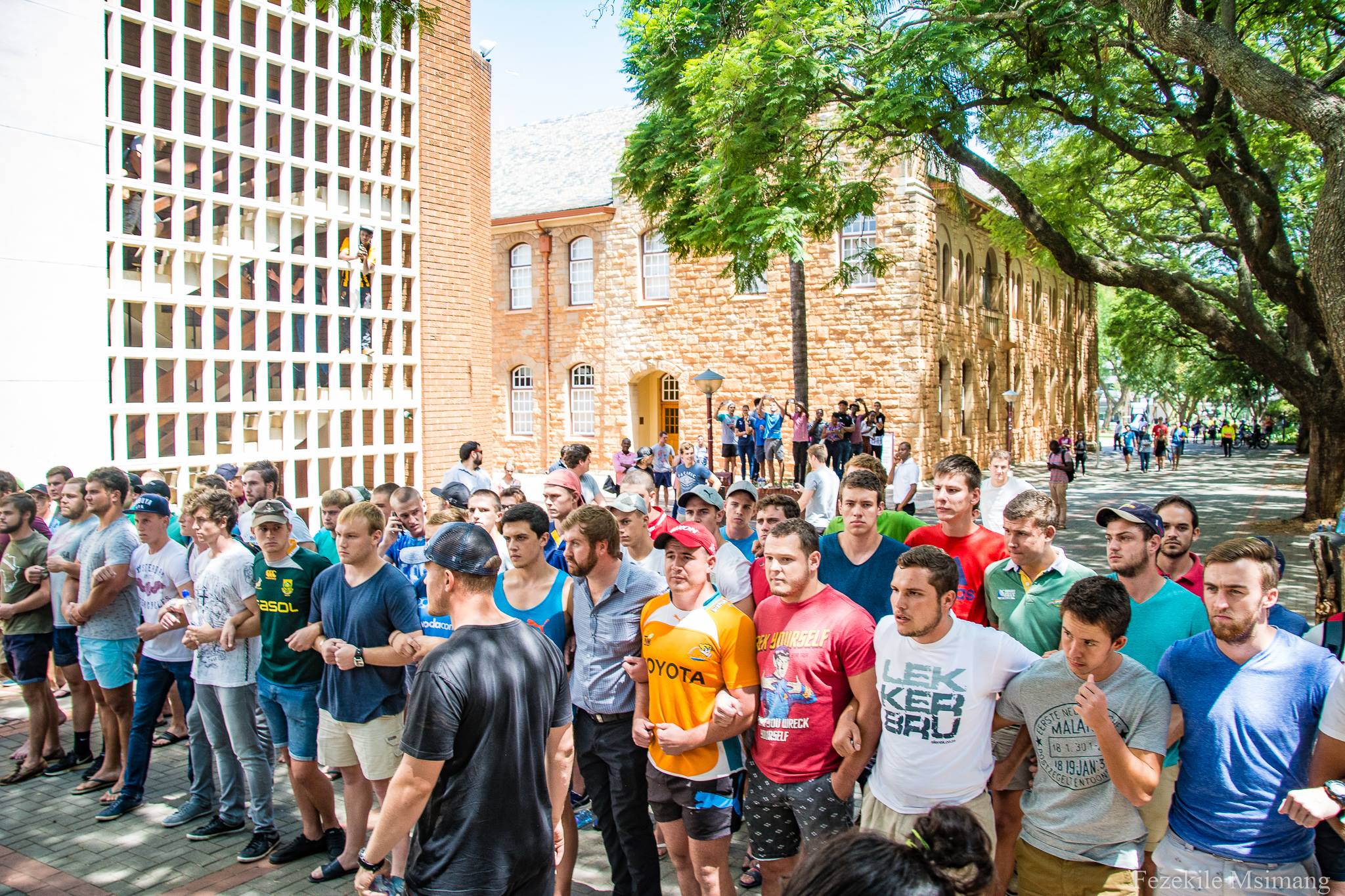 CREDIT: Fezekile Msimang Image source
CREDIT: Fezekile Msimang Image source
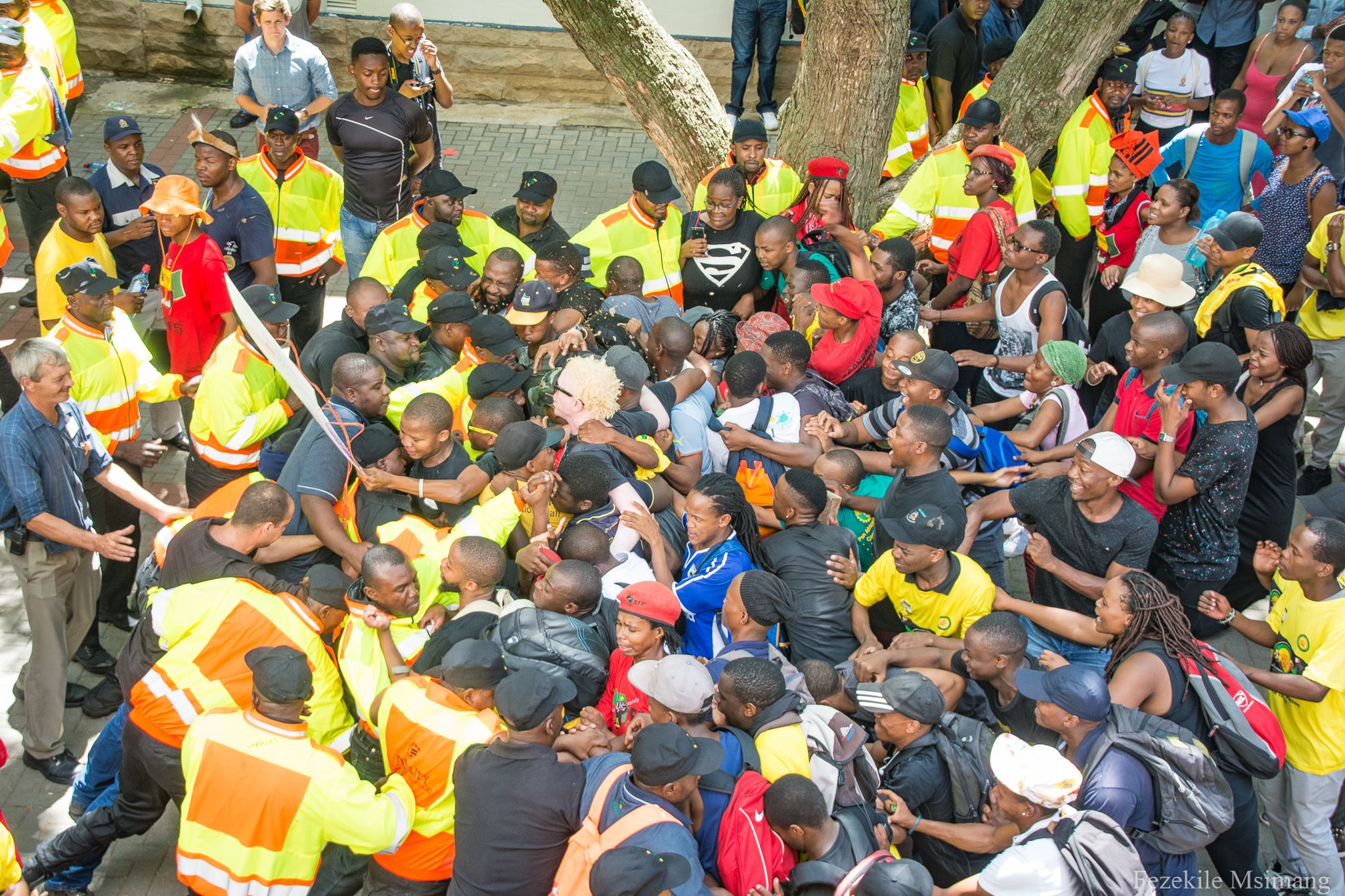 Security attempts to push a group of the students back as members of the group attempt to move forward. CREDIT: Fezekile Msimang Image source
Security attempts to push a group of the students back as members of the group attempt to move forward. CREDIT: Fezekile Msimang Image source
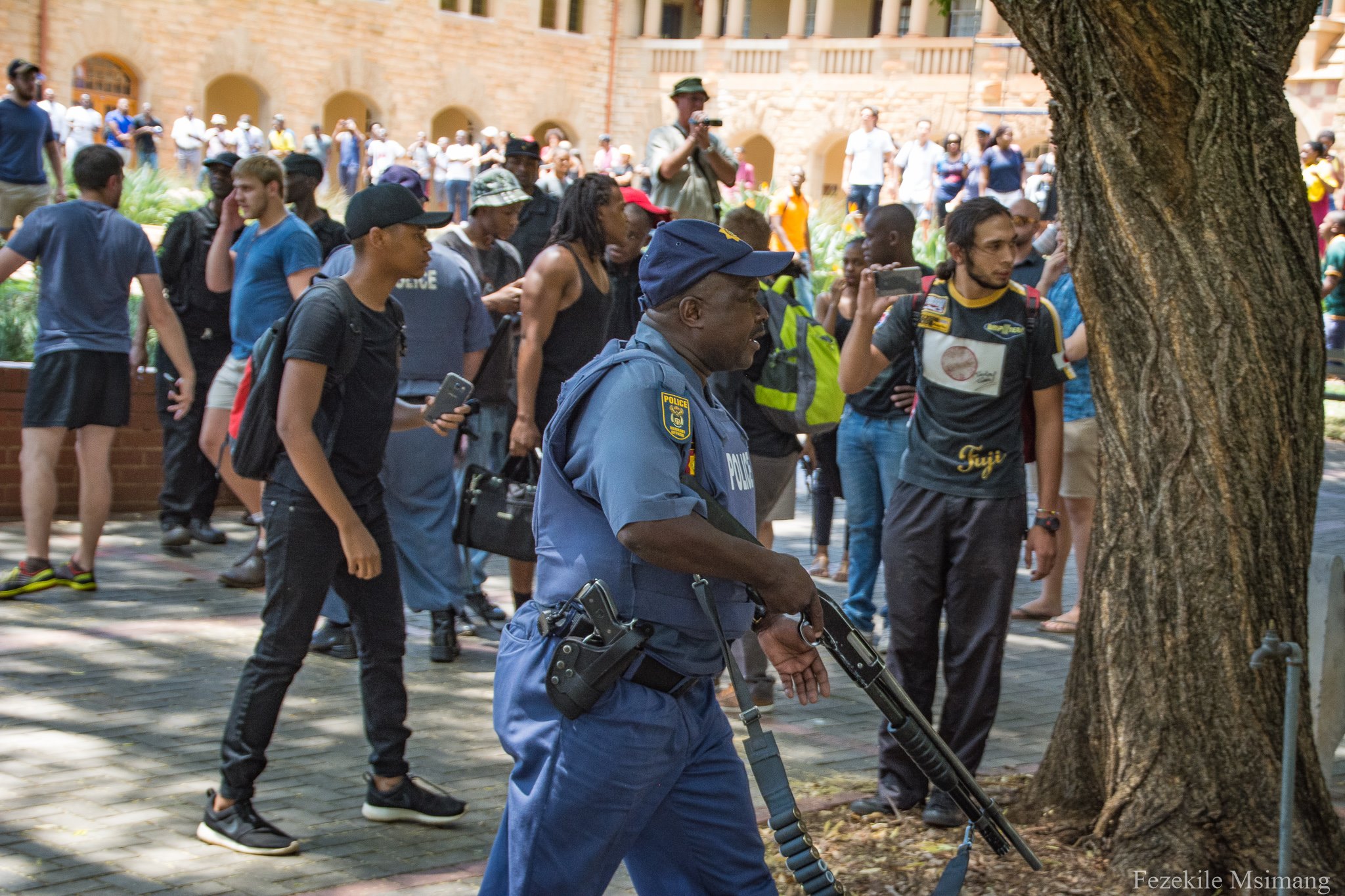 An officer moves towards a member of Afrikaans Must Fall (AMF) who was refusing to cooperate somehow with another officer. CREDIT: Fezekile Msimang Image source
An officer moves towards a member of Afrikaans Must Fall (AMF) who was refusing to cooperate somehow with another officer. CREDIT: Fezekile Msimang Image source
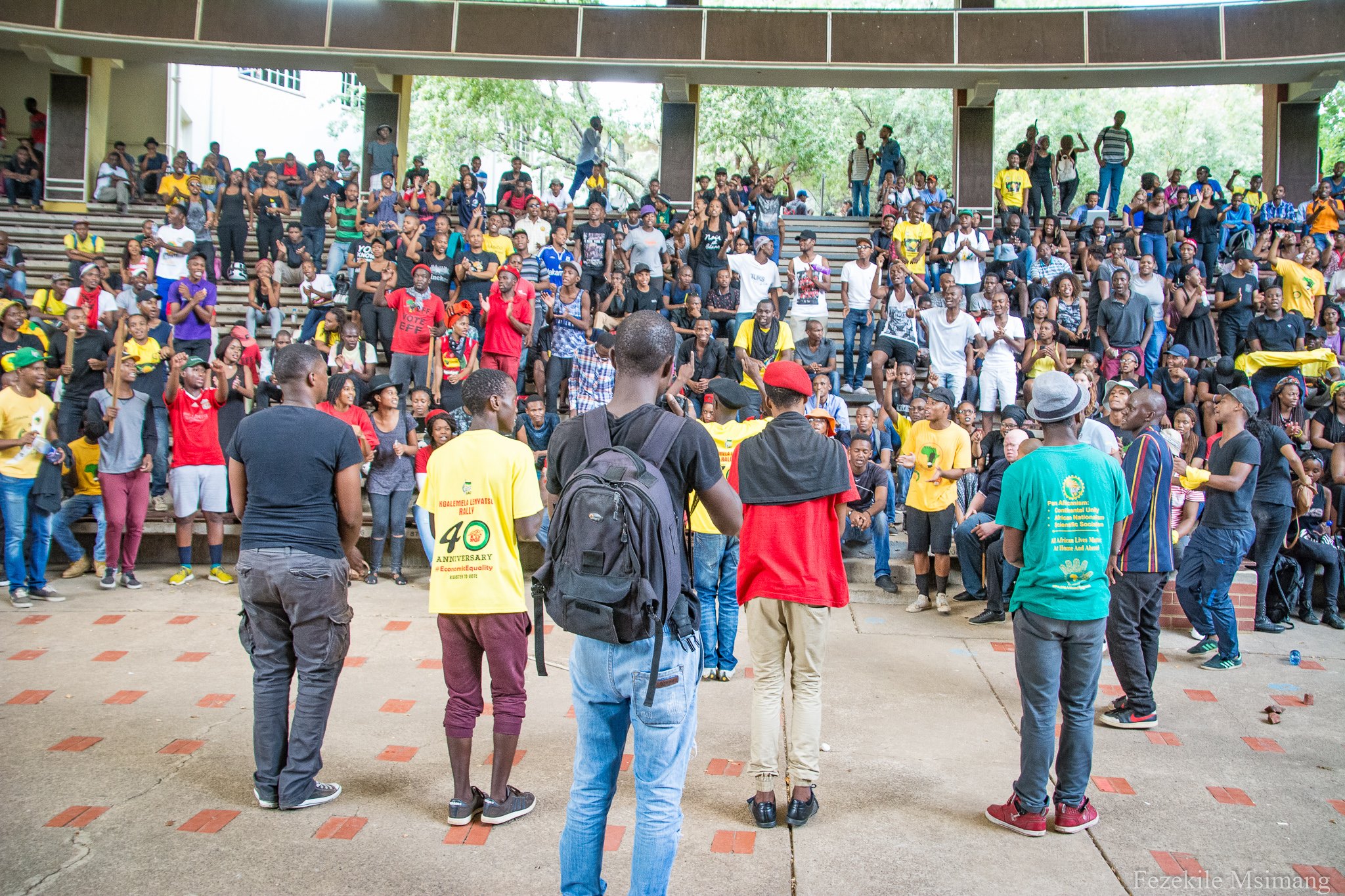 Some AMF supporters eventually manage to get past Afrikaans Sal Bly (ASB) supporters and security, and regroup in the Amphitheatre. CREDIT: Fezekile Msimang Image source
Some AMF supporters eventually manage to get past Afrikaans Sal Bly (ASB) supporters and security, and regroup in the Amphitheatre. CREDIT: Fezekile Msimang Image source
- While the conflict between White pro-institutionalised Afrikaans students and Black anti-institutionalised Afrikaans students was taking place, an inter-racial group of students who had organised a group prayer under the banner #SouthAfricaMustRise, a group associated with the #Colourblind campaign, were gathering in prayer. Local Christian priests were leading the gathering. Some reports characterise the group as a Christian community within UP, others state the gathering transgresses lines of religion.
The We are #Colourblind initiative begun recently in response to the disruptive protests on campus. It is a social media campaign started by a group of students from UP, that urges students to, ‘take a picture of themselves, with a person of another race, in grey-scale with a poster stating: #ColourBlind’.
“...Students of the University of Pretoria have decided that they are tired of lectures being cancelled because of a handful of radical students who have now turned what was meant to be a discussion about the University's Language Policy into a violent racial outburst...”- from #Colourblind’s Facebook page.
 Students were encouraged to take a picture of themselves, with a person of another race, in grey-scale with a poster stating: #ColourBlind. Image source
Students were encouraged to take a picture of themselves, with a person of another race, in grey-scale with a poster stating: #ColourBlind. Image source
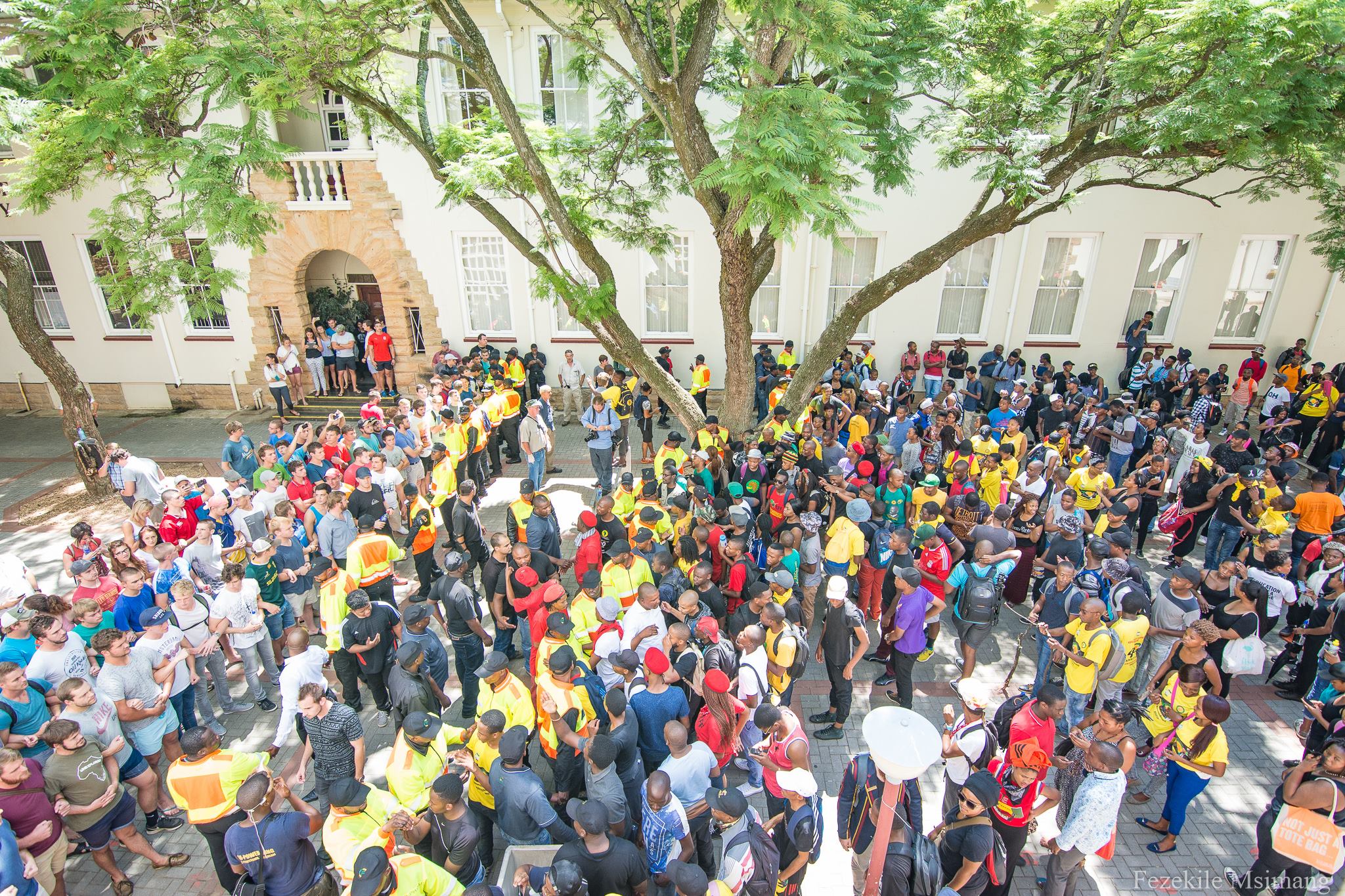 Afriforum Youth UP also led by Afriforum members, protest the meeting set up by the Language Policy Task Team with SACO-UP, EFFSC-UP and UPrising. Members of Afriforum form a human wall as members from the other student bodies are regrouping after the meeting was suspended due to the disruption. CREDIT: Fezekile Msimang Image source
Afriforum Youth UP also led by Afriforum members, protest the meeting set up by the Language Policy Task Team with SACO-UP, EFFSC-UP and UPrising. Members of Afriforum form a human wall as members from the other student bodies are regrouping after the meeting was suspended due to the disruption. CREDIT: Fezekile Msimang Image source
o UPrising Facebook memorandum [133]
Memorandum calling for the Ban of Afrikaans and all Cultures associated with Afrikaans.
This is a memorandum that explicitly states how Afrikaans and all cultures associated with it must be banned with the University of Pretoria and other structures that are affiliated with the University.
In consensus with all the student leaders within the University of Pretoria in all campuses including the Student representative Council (SRC) after the #Feesmustfall campaign in which the University agreed to look into the language policy of the University of Pretoria which puts Afrikaans as the first official language in the University of of Pretoria.
Different demands were raised. This follows the failure of the University to implement the language policy which puts English as the only official language in the University of Pretoria. This despite the fact that the agreement was entered into in October 2015. The Demands as follows:
1. We demand that there should be no victimisation of students who participated in the Afrikaans must fall protest.
2. All form of communication from the University should be purely in English. This includes but not limited to:
2.1 Signs around the campus should be written in English.
2.2 Formal communication should be in English. This includes:
2.2.1 The letter head of the University of Pretoria.
2.2.2 All Emails, Faxes and all other forms of digital communication should be in English.
2.2.3 The prospectus and any study guides issued to students.
3. We demand that the university abolish the English and Afrikaans bilingual requirement in ALL its employment posts.
4. We demand that there are gender and racial quotas in ALL faculties in the University. This is to allow for the advancement of the previously disadvantaged groups e.g. Black women and all other cultures outside the Afrikaans culture.
5. We demand a total decolonization of the curriculums within all Faculties in the University. The will aloe for the development of all departments within the faculties i.e. indigenous languages, African philosophy etc.
5.1 In achieving this Task, the University will have to look into appointing a task team with DE colonial scholars who specialise in decolonial scholary e.g. Ntate Mogobe Ramose from the University of South Africa to lead the task team or any other competent scholar who would head the task team.
6. The admission quotas in the University and the university residences should reflect the demographics of South Africa that is:
6.1 There should be more Black people to White people in the residences and the University as it is in South Africa by distributing them accordingly in these residences.
6.1.1 This entails that there should be no residence that has a dominating race to others as we currently see in the university. Meaning Tuks Naledi can’t be seen as the Black residence whilst Sonop as a White residence.
6.1.1.1 I achieving this, the University muct classify races as in official classification in statistics South Africa. This means that there must be Whites, Blacks, Coloureds, Chinese and Indians not just Black and White.
7. We demand complete abolition of residential and Day House cultures as we believe that they are the biggest perpetuators of the Afrikaans culture that oppressed Black South Africans previously and continue to oppress Black people in the University of Pretoria. This includes but not limited to:
7.1 Singing to statues in residences.
7.2 Addressing the House committees with Afrikaans names such as Juffrou and Meneer.
7.3 Thehouse songs that continue to praise Afrikaans and so forth.
8. We demand a complete abolition of the Department of Student Affairs as we believe they hinder contact or any form of communication with management. We therefore demand the SRC as the only coordinators between teh students and the management.
9. We demand a complete abolition of all Afrikaans names in the University including lecture halls, residential names, Day houses’ names et al.
9.1The University would therefore have to look into naming these buildings by our African heroes such as Dambudzo Marechera.
10. We demand that the Client Service Centre be names into Student Service Centre as it is a centre for exactly that and not clients.
11. STUKU as the main perpetuators of Afrikaans culture in the University must also be abolished.
12. We demand for complete ban of the name TUKS (Transvaal Universiteit Kollege) which signifies the oppressive Apartheid regime which saw the land of BaTswana renamed to Transvaal, a state that oppressed Black people in South Africa.
13. The University should be transparent about the current expenditure on maintaining Afrikaans as the medium of instruction in the University. This means that the University must be transparent on how these funds are going to be redirected when Afrikaans falls.
13.1 All the funds that were previously allocated to the Afrikaans programmes (language, culture, et al.) should be allocated to the financially needy students of the University.’
- UP releases a statement [134] :
‘...The Executive of the University have expressed deep concern about the rolling set of demands being made by protesters, which is compromising the good governance and management of the University. The current issue is related to the review of the UP language policy. However, no decisions have been made, as yet, on acceptance or approval of the proposed amendments. The current language policy will remain in place until any changes to this policy are officially approved...
Today the University was obliged to suspend academic activities on its Hatfield Campus due to repeated threats of disruptions and violence. The decision was taken because the safety of our students and staff remains paramount. There have been continued protests during the day.
We have implemented additional security measures and we continue to work with the police services to maintain order.
... University management are seeking to meet with protest leaders to find a peaceful solution to the current situation. ‘
23 February
- A group of pro-institutionalised Afrikaans protesters marches on Lynwood road requesting to speak to De la Rey. Their request is not met.
The Front National party leads the protesters and vows ensure the survival of Afrikaans at the University.
‘The Gauteng leader of the party, Wessel Basson, arrived at the university and spoke to a crowd just outside of one of the university’s locked gates.
Basson urged people to chant "Afrikaans sal bly" (Afrikaans will stay), and loudly asked where the DA and Freedom Front Plus were "when they are needed".
"Where is the DA that is supposedly fighting for us and for our language? They are not here. Where is the Freedom Front? Where is Pieter Mulder? We’ve been waiting since ’94 that you come here and fight for our language."
Basson called for Professor De la Rey to come forward and communicate with him.
He added that he was keen for a fight, but urged people to remain calm and orderly.
"I will definitely not bring any danger to you and will also not bring your life in danger. If the situation is so (hostile), then we will rather move to a safer place. There are a lot of woman and older people in between us. I am just as keen for a fight, believe me."’
- The Front National Party released a statement [148] before the march calling for ‘spontaneous action and self-protection’ and other calls to arms.
- ANC spokesperson Zizi Kodwa says the incidents are bad for the country.
“We are calling for tolerance, we are calling for cooperation. We are calling on the universities to be decisive to deal with issues that are raised by students as well as workers,” says Kodwa.
He adds that the party also calls on all those who are protesting, to respect the rights of others, the right to protest and the right not to protest.
He says, “It is important for universities to play their part, to build unity, to build democracy, to build non-racialism.”
- The University releases a statement [146] that when the campus opens next week, it will be taking a zero tolerance policy towards ‘any disruptive or unlawful behaviour’:
‘The University of Pretoria management are continuing to engage with student leaders and stakeholders in order to seek a way forward, based on principles of peaceful non-violent engagement, to address the issues that have led to disruptions and the suspension of classes on two of the University’s campuses.
Classes on the Hatfield and Groenkloof campuses of the University will remain suspended for the rest of the current week (22 to 26 February)...
Additional and more stringent security measures will be implemented before the University reopens, to avoid further disruptions of the academic year and to ensure the safety of our students and staff.
All students and staff have been informed that when the campuses re-open, the University will be enforcing an approach of zero tolerance of any disruptive and unlawful behaviour. There is an interdict in place which precludes violence of any sort on our campuses, and we will be enforcing it strictly, with the assistance of the South African Police Services.
We are implementing University disciplinary processes and will be reporting any cases of violent and unlawful behaviour to the police for possible prosecution.’
25 February
- UP says it will restart the process of amending its controversial language policy as the process was compromised by disruptive student protests.
The institution says it refuses to be pressured into taking a certain position. It blames student protests for jeopardising the consultation process.
“We were at the very beginning when this became an issue of protests, and very importantly it became an issue of violent protests, and violence is totally unacceptable. We can only have a fair [and] transparent process when conditions for peaceful engagement have been firmly returned to this university,” says De la Rey.
“This is a matter of national interest it's not just the University of Pretoria's matter because the national question is how do we uphold our commitment to multilingualism - which is in the Constitution. So there has to be a sectorial discussion. By sectorial I mean all 26 universities looking at how we going to collectively and individually honour that commitment,” De la Rey further said.
Outside influences were also accused of perpetuating student protests, by the University.
- UPrising Facebook statement [135] :
‘Students are meeting peacefully outside Prospect Street gates to hand over the memorandum to the VC.
There is an expected meeting between the VC and student leaders expected later in the day.’
- AfriForum Youth continues to reject the proposal to use English as the only medium of instruction, and has threatened to take legal action against the UP, if it officially abolishes Afrikaans as the second medium of instruction at the institution.
The Afriforum Youth also criticize the University for failing to prevent racially charged student clashes on campus.
Mostert says, “We will do our best to run projects and get legal action against the University to ensure that the right processes are followed, and to ensure the rights are protected. We have a constitutional right to our mother tongue education on campus.”
The University has still not made a final decision on the matter.
Daily prayers by the #SouthAfricaMustRise group continue to take place on campus.
“Once you go on campus now … there is no more unity. You feel like it’s broken, this is going to help make us one university. What is happening on campus is a division, you don't see any races coming together, here this is the total opposite people are coming together,” said one of the students from the prayer group.
While there have been no protests on campus for two days, the University still remains closed.
27 February
- A meeting occurs in Pretoria with ‘broad range of parties’ concerning issues at higher education institutions, including the language policy crises happening at UP:
The parties agreed to throw their collective support fully behind the re-opening of the UP on Monday, 29 February, and to ensure that the university is not closed again‚ except under exceptional circumstances.
Nzimande is said to hold an urgent meeting with De la Rey, and then with student leaders and AfriForum on Sunday to discuss racial tensions that have come to a head in violent protests.
"The intention is that the academic programme will start again on Monday", said Nzimande.
Meanwhile also in Pretoria, Gauteng representatives of the ANC, SA Communist Party (SACP), ANCYL, Cosatu, SA National Civic Organisation (SANCO), Afriforum, Afriforum Youth and Trade Union Solidarity also met to discuss the situation facing higher education institutions in the province, and UP in particular.
The party denounced intimidation‚ disruption‚ violence and attempts to polarise the University community along racial lines. They agreed that the recent protest events that resulted in violence on the campus “was engineered by opportunists with no track record of providing credible leadership and workable solutions where these are required”.
29 February
- UP management refuses to attend meeting with student parties. The reason given is that it will not enter into negotiations with ‘unregistered stakeholders’.
- UPrising releases statement [136] concerning a meeting UP management failed to attend.
In the statement UPrising remembers that the student body for FeesMustFall was not a registered stakeholder, but nonetheless spoke for a large number of the students and incited massive change.
The statement goes on further to suggest that only allowing registered stakeholders to partake in decision making processes is a harmful method of exclusion.
- Activities are scheduled to resume today after being suspended last week.
- Public Order Police are heavy on campus. EWN reports seeing three police military hippos at the nearby Brooklyn Station. ‘It’s further understood that a police control centre has been established on the grounds in the event a group forms and tries to disrupt academic activities.’
Security guards are checking every student’s access card before allowing them to enter through turnstiles.
- AfriForum and Afriforum Youth agree to peaceful negotiations with management and to end disruptions.
2 March
UP releases a warning to students that they could be suspended, expelled or criminally charged for liking, retweeting or getting tagged on social media posts that it deemed “hate speech".
"Students and staff should take note that not only posts or retweets but also likes, tagging and retweets of posts on social media which incite violence, harm or constitute hate speech are in contravention of the university's disciplinary code: students and South African legislation and constitute grounds for criminal and civil action," the University said in the message.
“Please note that if you allow your name to be coupled with any 'likes', 'tags' or 'retweets' of this nature, you are equally liable and that disciplinary action and possible suspension or expulsion from the university and/or criminal or civil action may follow."
The University further advised students not to allow their names to be tagged in posts that contravened the code.
The message also said students were "personally responsible for the use of your name on and social media platform. If your handle or name is attached to certain content, you are responsible for its publication".
- “The SRC notes with concern the tone of the university management with regards to its said regulations on social media. Although we recognise the need for responsible interaction and commentary; the current nature of the statement, we believe, creates a sense of victimisation and limitation of speech and engagement amongst students,”
“Furthermore, in light of the heavy security presence in the form of bouncers, and in light of the presence of the SAPS, and the general militarisation of our institution, we believe such a statement adds to the paranoia of students and the limitation of their freedom of expression as provided for in the Constitution of South Africa.”
“The SRC is in the process to engage our legal advisors as to what extent such statements are legal, legitimate and binding and how best to #unsilenceUP around such matters of importance. These tactics with the said intention to create a safe environment ironically instils a sense of fear among students and thus not conducive to the moral of an academic institution,”
- Bouwer, UP spokesperson, said "It is to make students aware that they must be careful of what they post on social media because the university can take action against them”.
4 March
- The Freedom of Expression Institute (FXI) condemns the University of Pretoria’s social media ban.
“The Freedom of Expression Institute strongly condemns the blanket ban from liking , re-tweeting and sharing of hate speech of staff , students and those affiliated with the University of Pretoria. This arbitrary action illustrates the fundamental deficit of understanding on how social media and the internet works. Likes, shares and re-tweets are not necessarily endorsements but potential facilitators of constructive debates about the issues that concerns us most in South Africa. Instead of imposing arbitrary bans, the University should rather focus action on only those who are directly responsible for hateful and dangerous speech on campus. A complete ban on commentary not only violates the right to receive and impart information...”
5 March
- Some meeting with management and movements occur.
5 March
EFF GP and EFFSC were planning a picket to UP in protest of arrested leaders (#BringBackOurLeaders) and in support of #AfrikaansMustFall on 10 March.
The picket is legally barred from occurring and is suspended from taking place.
18 March
- UP Street Law hosts a dialogue on the recent social media regulations issued by The University.
Question posed, “Are we within our rights to tag tweet or share whatever we want?”
1 April
- EFFSC-UP celebrates insourcing victories on a Facebook post:
‘Two sectors insourced today as per the Insourcing agreement. Contracts already signed some signing today. History made.
• From Servest Food Services to University of Pretoria Food Services.
• From Fedility Security Services to University of Pretoria Security Services
Amandla!’
7 April
- #Tuks27, now #Tuks24 set to appear in court for the second time today.
- UPrising Facebook statement [137] :
‘We stand in solidarity with all the 24 students appearing at the Pretoria Magistrate's Court today. We call for our courts to apply the rule of law without prejudice or favour and acquit all 24 UP students of any wrongdoings.
We will be departing from the Main gate on Lynwood road at 7:30 as the court presiding will start at 8:30. We will then return to the Hatfield campus to hold a Language Policy Symposium at 14:00 with students...’
- Court case is postponed to 18 July 2016. Reason given is further evidence is expected to come in the following day.
Endnotes
[101] Missing. ↵
[102] Missing. ↵
[103] https://www.facebook.com/TUKSEFF/photos/a.652261694901481.1073741831.391977514263235/773984526062530/?type=3&theater ↵
[104] http://www.up.ac.za/en/news/post_2179301-student-fees-2016 ↵
[105] https://www.facebook.com/TUKSEFF/photos/a.392154244245562.1073741826.391977514263235/776660559128260/?type=3&theater ↵
[106] http://www.iol.co.za/news/crime-courts/tuks-obtains-secret-interdict-over-protests-1934102 ↵
[107] https://www.enca.com/south-africa/reopen-monday ↵
[108] https://twitter.com/sbokhuzy/status/657414985262473216/photo/1
https://www.jacarandafm.com/news-sport/news/university-pretoria-students-resume-protest/ ↵
[109] http://www.up.ac.za/en/news/post_2180801-update-fees-at-university-of-pretoria ↵
[110] Missing ↵
[140] http://www.up.ac.za/en/news/post_2181159-student-protest-at-up-latest-information ↵
[42] http://www.thepresidency.gov.za/pebble.asp?relid=20860 ↵
[144] Missing ↵
[141] http://perdeby.co.za/sections/news/tuks-news/4634-university-of-pretoria-resolves-disputes-with-protesting-students ↵
[142] http://www.up.ac.za/en/whats-happening/2185509 ↵
[145] http://www.up.ac.za/en/whats-happening/2182175 ↵
[143]: https://www.facebook.com/TuksUPrising/photos/a.1655559804691962.1073741829.1652315128349763/1658109101103699/?type=3&theater ↵
[111] https://www.facebook.com/TuksUPrising/posts/1658977464350196
http://www.news24.com/SouthAfrica/News/tukkies-students-workers-disrupt-registration-20160111 ↵
[112] https://www.facebook.com/TuksUPrising/photos/a.1655559804691962.1073741829.1652315128349763/1662258337355442/?type=3&theater ↵
[113] http://www.up.ac.za/en/news/post_2210247-joint-statement-from-the-vice-chancellors-principals-and-rectors-of-universities-of-south-africa ↵
[114] http://www.up.ac.za/en/news/post_2213899-ongoing-protest-action- ↵
[115] http://www.up.ac.za/en/news/post_2214237-university-closed-on-13-january-2016 ↵
[116] https://www.facebook.com/TuksUPrising/posts/1677242195857056 ↵
[117] Missing ↵
[118] https://www.facebook.com/TuksUPrising/posts/1677892095792066 ↵
[119] http://www.up.ac.za/en/news/post_2215217-protest-action-latest-information-sunday-17-january-2016 ↵
[120] https://www.facebook.com/TuksUPrising/posts/1679192448995364 ↵
[121] http://www.wwmp.org.za/index.php/24-feesmustfall/123-outsourcing-ends-at-university-of-pretoria ↵
[122] http://citizen.co.za/954102/954102/ ↵
[123] http://www.up.ac.za/en/news/post_2218521-university-of-pretoria-task-team-on-implementation-of-insourcing-begins-work ↵
[124] http://www.up.ac.za/en/news/post_2221617-task-team-on-implementation-of-insourcing-latest-information ↵
[125] https://www.afriforum.co.za/afriforum-youth-removed-feedback-meeting/ ↵
[126] http://www.up.ac.za/en/news/post_2222129-announcement-revision-of-the-university-of-pretorias-language-policy ↵
[127] https://www.facebook.com/TUKSEFF/posts/833144233479892 ↵
[128] http://ewn.co.za/2016/02/19/Calm-restored-14-arrested-at-UP-student-protest ↵
[132] http://www.sabc.co.za/news/a/748e17004bca54429a4c9e96fb2bb898/ReligiousundefinedleadersundefinedhelpundefineduniteundefineddividedundefinedTuksundefinedstudents-20162302 ↵
[133] https://www.facebook.com/TuksUPrising/photos/pcb.1691434341104508/1691434297771179/?type=3&theater ↵
[134] http://www.up.ac.za/en/whats-happening/2236113 ↵
[146] Missing ↵
[135] https://www.facebook.com/TuksUPrising/posts/1692262121021730 ↵
[136] https://www.facebook.com/TuksUPrising/photos/a.1655559804691962.1073741829.1652315128349763/1693811680866774/?type=3&theater ↵
[137] https://www.facebook.com/TuksUPrising/photos/a.1655559804691962.1073741829.1652315128349763/1711127639135178/?type=3&theater ↵
[148] Missing. ↵
